#if you want to use him as a main character there’s an additional essay requirement where you prove that you’ve read and understood SB94
Text
Comic book writers who want to use Superboy as a character should be legally required to first submit an essay, demonstrating that they know what Tactile Telekinesis is and listing at least one interesting thing they plan to have him do with it, before they’re allowed to write for him.
#this also applies to batfam fanfic writers btw#no Kon unless you can demonstrate the base level of knowledge and interest#also this is only the requirement for using him as a side character#if you want to use him as a main character there’s an additional essay requirement where you prove that you’ve read and understood SB94#conner kent#kon el#superboy#anyway I’m annoyed by the Speed Force series
219 notes
·
View notes
Text
David Gerrold is the uncredited co-creator of Star Trek: the Next Generation
He should be listed as the creator of the series alongside Gene Roddenberry. The defining elements of TNG that mark it as distinct from its predecessor were, nearly, all David Gerrold’s ideas.
In very, very early publicity for the series, like Entertainment Tonight’s earliest pieces on TNG, David Gerrold is not just another guy in the writing room; he is treated as a showrunner by the publicity of the series (though that term obviously was not in widespread use in 1987). And this is not just my opinion, either: there’s actually a complaint with the Writer’s Guild that David Gerrold was essentially assigned producer duties, but was not paid as a producer – a suit that Gerrold won to the tune of six figures.
This early piece here in Starlog says that David Gerrold wrote the series Bible for TNG:
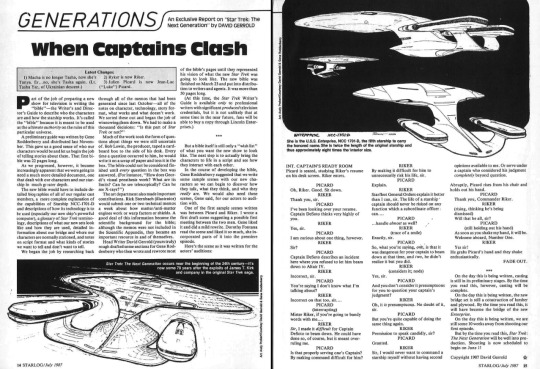
What’s more, many of Next Gen’s unique elements are Gerrold ideas. In David Gerrold’s World of Star Trek essays in the 1970s, which were widely reprinted, Gerrold called for the following changes to Star Trek:
The first officer should lead away missions, not the captain (Gerrold preferred the term “contact team” in the 70s, though he later used the term “away team”)
Since deep space missions are non-violent and require a great deal of time (possibly a decade or more without seeing a starbase), families should live on the ship alongside the crew.
The Klingons will, probably in the future, become allies of the Federation, and we may see a Klingon serve in Starfleet. Gerrold’s phrasing was “today’s foes are tomorrow’s allies.”
If families serve on a ship, it therefore stands to reason that mental health would be significant, and an important officer would be a ship’s therapist or counselor, who would be in on meetings and consulted.
To be clear, Gerrold’s essays were not obscure little memos in Paramount. They were widely read in the fandom world. If you’re old like me, you probably remember reading them back in the day.
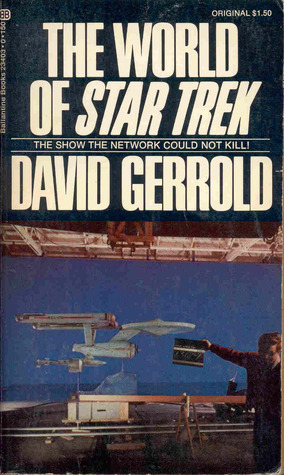
David Gerrold had a lot of other ideas that were only partially used. For example, he believed fashion would be totally intersex (which explained why, in early TNG episodes, there were men in miniskirts), and that homosexuality would be widely accepted in the future (in fact, Gerrold wrote an AIDS-analogue episode that was rejected that may be one of the most famous unmade episodes of TNG’s first season, which would have had gays in Starfleet as early as Next Gen season one). “Blood and Fire” is to TNG what Ellison’s “Perils of the City” is to the original series, better known as a script and lore.
Not all of these ideas were that progressive. Some were kinda…loopy. David Gerrold also wanted dolphins and whales to be a part of the crew, used as navigators, in sections set aside as their own tanks. Like the idea that the captain would only make decisions with his therapist beside him on the bridge, talking dolphin crewmembers seems to be the idea that dates TNG most firmly to the 1980s. You can kinda tell that Gerrold lived his whole life in California.
One character in particular was David Gerrold’s idea above all else: Lieutenant Worf. Here’s a publicity image from early TNG. Notice anyone who’s missing? Worf was not anything other than a background character, until at Gerrold’s insistence, he was elevated in the script.
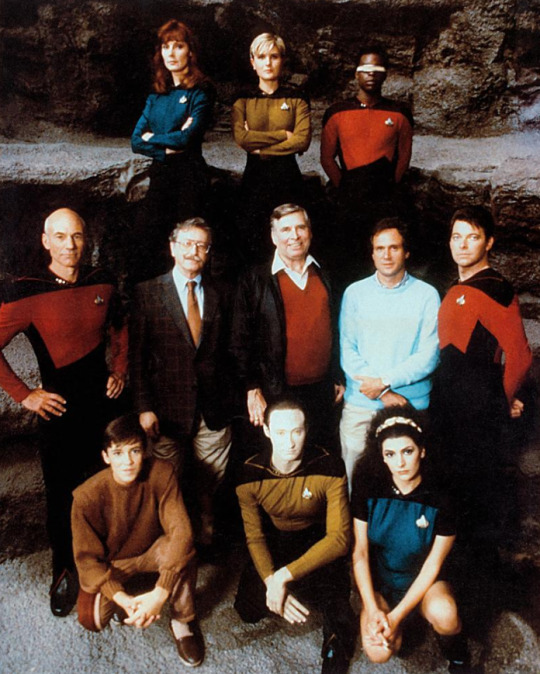
Gene Roddenberry in particular did not like Worf as a main character (as a background bit, that’s fine), but Gerrold guided him into a main character role.
To be clear, not every TNG idea was Gerrold’s. No show is ever just the vision of one person. The holodeck was mentioned in Gene Roddenberry’s original proposal for the original series in 1964, but they only had the ability to show it come the animated series in the 70s (as all true trekkies know, the animated series, not TNG, introduced the holodeck). Gene L. Coon made many additions to Trek lore, but that one was all Roddenberry’s. Emergency Saucer Separation also was mentioned in the original series as well, as an emergency tactic. The Q were the most Gene Roddenberry idea of all: a godlike alien race that puts mankind on trial for barbarism (and to his credit, the original writing room thought he wouldn’t work).
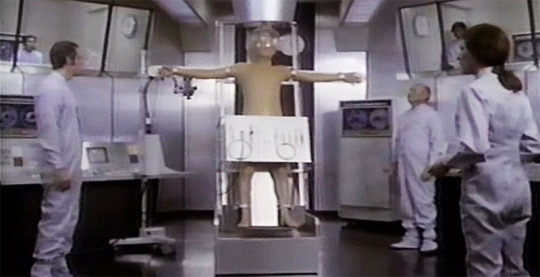
Data actually came from an unaired Roddenberry pilot about a robot searching for his creator who becomes best friends with a human engineer, the Quaestor Tapes (in fact, the robot there actually says “I am fully functional” and I almost fell out of my chair). Troi and Riker are essentially reskins of Ilia and Decker from Star Trek the Motion Picture. Andrew Probert created the Ferengi, the look of the TNG Enterprise, and the idea that the bridge is more of a “hangout spot” due to automation, since the operation of the ship could be counted on to work without someone manning stations like in a submarine. Love him or hate him, the Borg were mostly producer Maurice Hurley’s idea.
Gerrold left after the first season, but don’t feel bad about Gerrold, though. It feels like every other superhero project draws from his Man Who Folded Himself, about a guy who time travels so often that he splits the timeline over and over and interacts with endless variations of himself. His alien invasion series, War Against the Cthorr, was fascinating in that it was an alien invasion that is ecological in nature, with a hostile alien ecosystem that replaces our own. In other words, he is a great writer independent of Trek and it rubs me the wrong way people call him the “tribble guy” still. And he is still very much alive, although, tragically, he has succumbed to being extremely online.
575 notes
·
View notes
Text
On Ardyn, The Crystal’s Rejection of him and the history of the Lucis Caelum line
As far as villainous backstories go, Ardyn’s has been one of the most discussed ones basically since FFXV came out. This is partly due to the fact that the game has a very obvious weakness in its storytelling, and so parts of the story, character backgrounds and even lore are obscure at best. The fact that Ardyn himself is basically the only one who tells us what happened, providing only a one-sided, biased account of the past, does not help. Bahamut may add his own two cents once Noctis is sucked into the Crystal, but while he confirms the major points, he doesn’t provide any details (that I remember).
This first account of how Ardyn came to be what he is basically amounted to him being of the Lucis Caelum line, meant to take the throne, but being supposedly usurped and/or betrayed by another. However, in Bahamut’s own version of the story, it is Ardyn who is called the Usurper, as if he had been the one in the wrong.
Then his DLC came out and a lot of retconning happened and the current stance is that he was ‘robbed of his throne’ by his brother Somnus, rejected by the Crystal for doing what he was ordained to do and overall just having been dealt a shitty, unfair hand in life, so please feel very very sorry for him. *rolls her eyes*
Yeah, I’m not gonna do that. I want to know what really happened. So I’m going to absolutely ignore Episode Ardyn (EPA) and its prologue (EPAP) because they’re not considered canon to the main game, anyway. They’re an alternate timeline and thus do not matter to me. I’m interested in canon. So that’s where I went digging.
As a TL;DR, here are my conclusions: Ardyn being rejected by the Crystal is actually his own damn fault, for two reasons. One, he did something he absolutely was not meant to do, and you can argue that it was just him being altruistic and wanting to help people and that it was the right thing and his heart was in the right place, but it doesn’t change the fact that it wasn’t what he was supposed to be doing and it ended up doing more harm than good, specifically to himself. (In case it’s not clear, I’m talking about the whole ‘healing the sick’ thing.) Two, he misunderstood pretty much everything about his so-called Calling. He wasn’t ‘chosen, then rejected’, he was rejected because he felt entitled enough to tell himself he was chosen when he was actually not. And when the Crystal put him in his place for his audacity, he got mad and threw a tantrum like a little kid.
Yes, I am telling you that Ardyn wasn’t actually betrayed by anyone other than his own ego. He was a manchild with a humongous sense of entitlement who couldn’t handle being told ‘no, you got it wrong, back off’. That’s all it is.
As for how I reached these conclusions, a whole-ass essay is under the cut. If you wish to defend Ardyn, agree with me or otherwise discuss it, please feel free so long as you fulfill two requirements:
You actually read the essay below.
You will remain polite.
Thank you.
Acknowledgments: translations from Spanish (ES) (and the original ES texts) provided by Yrathiel on Discord. The German (DE) and French (FR) versions were translated by me. All the texts are transcribed directly from the archives in the game.
I) Ardyn’s story
All right, so what made me reach those conclusions about Ardyn’s story being so vastly different from what he tells us? Well, the answer to that question is actually in the game itself, scattered throughout the datalogs (and with additional info being interestingly scattered throughout the different localizations of the game, too). Let’s start with the simple and obvious: Ardyn’s entry in the dossiers (specifically part 3 of his entries, since we’re not interested in the parts about him being Niflheim’s Chancelor):
“Though Ardyn was born to become the Founder King of Lucis, fate had other plans for him. Blessed with the power to heal those afflicted with the Starscourge, he travelled the world purging the plague from their bodies by absorbing it into his own. Yet when he stood before the Crystal for judgment, it deemed him unworthy of becoming its chosen champion, decrying him as impure of heart. Ardyn was cast into exile, shunned by the people who once adored him and condemned by his own flesh and blood. He now seeks revenge on the Lucian bloodline -- in particular, on the ‘True King’ chosen to serve as the Crystal’s champion: Noctis Lucis Caelum.”
What’s interesting to note here, despite the sometimes confusing syntax (in terms of what it tried to imply), is the word choice in the important parts. ‘Ardyn was born to become the Founder King’, not chosen for it. This implies that, if not an official monarchy, a line of succession was already in place and the only thing that made him the one meant to be next in line and apparently becoming the first proper King was his blood. His birthright. He then sought the Crystal’s judgment, but was unworthy of becoming ‘its champion’. However, ‘the Crystal’s champion’ is not the Founder King, it’s the True King, the role Noctis was chosen for. What this means is that Ardyn’s Calling, job or whatever you want to call it never had anything to do with being chosen by the Crystal. He was never a Chosen of any kind. He was born a future ruler and meant to be the Founder King - the first King - of Lucis, but no part of this entry ever says anything about the Crystal being involved.
However, his bestiary entry contradicts that a little bit; it still confirms more than it contradicts, though:
“The man who was to be the first King of Lucis. Assuming the burden of the Starscourge corrupted the Chosen’s body, causing the Crystal to deny his ascendance to the throne. Ardyn’s impurities grant him eternal life, which he spends plotting his revenge upon the blood royal and the True King.”
So, apparently he was called a Chosen. Not just born to rule, Chosen. But here’s the question: chosen by who or what? We have no indication of that here. And interestingly, this is the only time in the archives (and in the game as a whole if memory serves, outside of Ardyn’s own, self-absorbed, entitled dialogue) that he’s ever called a ‘chosen’. So chances are it’s not the same kind of ‘being chosen’ as Noctis and other languages confirm this.
FR
”Ardyn should have once become the very first King of Lucis. He was a good, altruistic man whose organism was capable of absorbing the parasites which were the origins of the Ill of the planet [=Starscourge] and the daemons, which allowed him to save countless lives, but also to gain immortality. Unfortunately, his defiled body was rejected by the Crystal and Ardyn was stripped of his royal status, banished and removed from history. Thus, he did everything to take vengeance on his family, casting the entire world into darkness and ensuring that Noctis would obtain the power of the Crystal in order to eliminate him as the king of light.”
“This man should have been the first King of Lucis. The Crystal refused him this privilege after Ardyn was tainted by the Ill of the Planet. This change, however, granted him eternal life. An unlimited amount of time which he uses to construct his machiavellian revenge against the genuine royal family.”
(For those who don’t know, as I had to look it up myself: ‘machiavellian’ means ‘cunning, scheming, and unscrupulous, especially in politics’)
FR - Original
“Ardyn aurait dû devenir autrefois le tout premier Roi de Lucis. C’était un homme bon et altruiste don’t l’organisme était capable d’absorber les parasites à l’origine du Mal de la planète et des daemons, ce qui lui a permis de sauver d’innombrables vies, mais aussi d’acquérir l’immortalité. Malheureusement, son corps souillé a été rejeté par le cristal, et Ardyn a été dépouillé de sa royauté, banni, et effacé de l’Histoire. Il a alors tout mis en œuvre pour se venger de sa famille, plongeant le monde entier dans les ténèbres et faisant en sorte que Noctis obtienne le pouvoir du cristal dans le but de l’éliminer en tant que roi de la lumière.”
“Cet homme aurait dû être le premier roi de Lucis. Le cristal lui a refusé ce privilège après qu’Ardyn ait été corrompu par le Mal de la planète. Cette altération lui a néanmoins offert la vie éternelle. Une durée illimitée qu’il utilise pour échafauder sa machiavélique vengeance contre la véritable famille royale.”
DE
“As the first born of the Izunia family, which was once chosen as the line of Lucis Caelum due to its special abilities, he should have become the first King to protect the Crystal. Yet he used his powers to cure the people afflicted by the Astral Plague [=Starscourge] by absorbing the parasites of darkness into himself. As a result, he was rejected by the Crystal, attacked by his brother and ultimately banned into exile. Since then, the darkness has taken hold of him more and more and the hatred towards the Crystal and the line of kings is his only motivator. His true objective is to eliminate the chosen king after the powers of the Crystal and his ancestors were combined within him.”
“Ardyn was chosen to become the first King of Lucis, but the Crystal denied him this honor after he came in contact with Scourge-infected cells. Having become immortal through the absorption of the Scourge-infected cells, Ardyn’s hatred towards the royal family continued to grow. His deepest desire to one day take his revenge on the Chosen King.”
(Translation note: ‘Scourge-infected cells’ is the translation I decided to use for ‘Siecherzellen’, which is a combined word of ‘siech’ and ‘Zellen’, the latter meaning ‘cells’. ‘Siech’ is a formal and slightly archaic word that implies ‘long-time sick and weak (from age), without any serious hope of recovery’, and can be translated as ‘infirm’, but I decided to go with a less literal translation due to context.)
DE - Original
“Als Erstgeborener der Familie Izunia, die einst für ihre besondere Fähigkeiten zur Linie der Lucis Caelums erwählt wurde, hätte er der erste König zum Schutze des Kristalls werden sollen. Doch er nutzte seine Kräfte, um die von der Astralplage befallenen Menschen zu heilen, indem er die Parasiten der Finsternis selbst in sich aufnahm. Daraufhin wurde er vom Kristall verstoßen, von seinem Bruder angegriffen und schließlich ins Exil verbannt. Seitdem hat die Dunkelheit immer mehr besitz von ihm ergriffen und der Hass auf den Kristall und die Linie der Könige ist sein einziger Antrieb. Sein wahres Ziel ist es, den erwählten König zu vernichten, nachdem dieser die Macht des Kristalls und seiner Ahnen in sich vereint hat.”
“Ardyn war dazu auserkoren, der erste König von Lucis zu werden, doch nachdem er in Berührung mit Siecherzellen gekommen war, wurde ihm diese Ehre vom Kristall verwehrt. Durch die Aufnahme der Siecherzellen unsterblich geworden, wuchs Ardyns Hass gegen das Königsgeschlecht weiter. Es ist sein innigster Wunsch, sich eines Tages am erwählten König zu rächen.”)
ES
“Ardyn was born to rule over Lucis as its original and founder King, but destiny had other plans for him. He received a holy power that permitted him to heal victims of the Scourge, the calamity of the stars, and travelled over all Eos to purge the sickened of their maladies and to absorb the plague into his body, infecting himself. When he finally presented himself to the crystal to receive its gifts, he was repudiated without expecting it due to having impurities in his heart. He was exiled and scorned by those that adored him before, and even his own family turned their backs to him. Ardyn's objective is to unload his ire against the heirs of Lucis and especially to obtain his revenge against the 'throned one', favoured by the crystal: Noctis Lucis Caelum.”
“His destiny was to become the Founder King of Lucis and the Chosen of the Crystal, but his dirty soul was repudiated by it and he never was able to become a monarch. He turned immortal after assimilating the Scourge and his objective is to defeat the 'throned one' for the Crystal to suffocate the hate he has accumulated.”
ES - Original
“Ardyn nació para reinar sobre Lucis como rey primigenio y fundador, pero el destino tenía otros planes guardados para él. Recibió un poder bendito con el que podía curar a las víctimas de la estepatía, la calamidad de las estrellas, y viajó por todo Eos para purgar a los aquejados de sus males y absorber la plaga contagiándosela a sí mismo. Cuando finalmente se presentó ante la Santálita para recibir sus dones, fue repudiado ante todo pronóstico pues albergaba impureza en su corazón. Fue desterrado al exilio y menospreciado por aquellos que en su momento le adoraban y hasta su propia familia le dio la espalda. Su objetivo es descargar su ira contra los herederos de Lucis, y en particular, vengarse del Entronado, favorecido por el Cristal: Noctis Lucis Caelum.”
“En su destino estaba ser el rey fundador de Lucis y el elegido por la Santálita, pero su sucia alma fue repudiada por esta y jamás consiguió convertirse en monarca. Se volvió inmortal tras asimilar la estepatía y para sofocar el odio acumulado se dispone a derrotar al Entronado por el Cristal.”
Notable differences and similarities between the versions:
English and Spanish are the only versions to claim Ardyn’s healing powers were in any way related to the gods (being ‘divine’, or that he was ‘blessed’). The other versions acknowledge his abilities, but don’t provide any sort of insight of where they came from. They’re just there, his, and that’s it.
German is the only version to claim the Izunia family was chosen as the ‘Lucis Caelum line’ due to the abilities people of the family had long before Ardyn was appointed King.
All versions agree Ardyn was meant to be the Founder King, but German alone directly states he’d be ‘the first king to protect the Crystal’.
Spanish is the only version that outright states Ardyn was the Crystal’s chosen. He’s not deemed chosen by the Crystal in any other version. Though he’s said to have been ‘chosen’ in English, it’s never stated it was the Crystal that did the choosing.
French is the only entry to claim Ardyn was actually removed from history, or that he was a ‘good and altruistic’ man.
German, English and Spanish all insist on the fact that Ardyn was born with the right to the throne.
All versions agree Ardyn was rejected by the Crystal due to being defiled by the Scourge. Spanish and English further insist on an impurity of heart (and soul in ES), but also present the whole rejection as a matter of ‘fate’ or ‘destiny’. Meanwhile, the German phrasing paints Ardyn’s journeys to save the people as something he was not supposed to do, something he did instead of the job assigned to him, i.e. being King. EN phrasing, on the other hand, seems to try to imply that Ardyn healing the sick should have made the Crystal accept him, yet instead it rejected him for his ‘impure heart’. French insists on how his actions saved innumerable lives and paints his rejection as something of an ‘unfortunate circumstance’ or a ‘regrettable turn of events’ more than anything else.
So, looking at all this, we have a pretty strong case for two facts being certain facts: that Ardyn’s ascension to the throne was his birthright and that the main reason for the Crystal rejecting him was the Scourge. The question of him being ‘chosen’ is harder to answer with just this, considering the inconsistencies between the different versions, and sometimes even within one localization (looking at you, EN). However, it seems safe to assume that even if he had been chosen, it was not by the Crystal. So that begs the question of who or what could have possibly chosen him, and for what exactly if he was already meant to be King by birthright and blood line?
Well, there’s this particular detail in the German version stating Ardyn would be ‘the first King to safeguard the Crystal’. We also know the Astrals expected the Lucis Caelum line to safeguard the Crystal. It was basically their calling. Does that mean Ardyn was the one bequeathed the Crystal by the Astrals? This seems to be the general (fan) consensus; or at least that Bahamut bequeathed the Crystal onto the Lucis Caelum line in the time of Somnus and Ardyn and that they didn’t have it before. This fact is contradicted by EPAP, but we’ve already established that EPAP is not part of the canon continuity, so we can disregard that little issue.
However, the fact that this same version of the entry also states the Izunia family had been chosen to be the Lucis Caelums before would contradict that assumption better than EPAP anyway. Because the Lucis Caelum line was founded when Bahamut gave them the Crystal and the Ring, officially making them royals and naming them Kings. Right? And yet Ardyn is the ‘first King to protect the Crystal’? When the title of ‘Lucis Caelum’ had already been bequeathed? Something seems fishy here. Let’s take a look at the Cosmogony.
II) The Crystal and The Ring of the Lucii
(All translated entries are immediately followed by their original texts from here on out.)
Cosmogony entry - The Crystal.
EN
“There once lived a man, born mortal, but blessed with powers divine. Conjuring a collection of glaives, he dispelled the darkness plaguing our star. As a reward for his efforts, the gods granted him a holy stone - the Crystal, which he was to guard at all costs. For it would one day choose a King to see us through the coming disaster and lead us to salvation.”
FR
“There was once a man with extraordinary powers. He could use multiple arms with ease and he fought the darkness that threatened to swallow the planet. Impressed by his bravery, the Six presented him with a holy stone and ordered him to protect it, for it was destined to choose the King who would save the world.”
“Il y avait autrefois un homme au pouvoir extraordinaires. Il pouvait utiliser plusieurs armes avec aisance et il combattit les ténèbres qui menacèrent d’engloutir la planète. Impressionnés par sa vaillance, les Six lui remirent une pierre sacré et lui ordonnèrent de la protéger, car elle était destinée à choisir le Roi qui sauverait le monde.”
DE
“Even among mortals, there was one who had great powers. With his powerful blades, he stood against the darkness. One day, the Six entrusted him with a Crystal to protect. In the time of the greatest plight, they said, it would choose a King who would save mankind.”
“Auch unter den Sterblichen gab es einen, der über große Kräfte verfügte. Mit seinen mächtigen Klingen stellte er sich der Dunkelheit entgegen. Eines Tages vermachten die göttlichen Sechs ihm einen Kristall zum Schutze. In größter Not, so sagten sie, würde dieser einen König erwählen, den Menschen Rettung zu bringen.”
ES
“A long time ago, there was a man that, even having mortal blood, was blessed with divine powers. He wielded weapons that he summoned from nothing with the power of his will, and with them he banished the darkness of our world. He received a holy/blessed Crystal from the Astrals, and also the duty of safekeeping it at any price, since it would choose the 'throned one', who would grant the world its salvation.”
“Érase una vez un hombre que, a pesar de tener sangre mortal, fue bendecido con sus poderes divinos. Blandió armas que conjuraba de la nada según su voluntad y con ellas desterró la oscura calígine de nuestro mundo. Recibió de los Sidéreos un cristal sagrado, la Santálita, y el cometido de velarlo a cualquier precio, pues su gracia habría de elegir al Entronado por cuya mano alcanzaría el mundo la salvación.”
It is interesting to note that only EN and ES mention the powers that were ‘divine’ in nature or say that he could conjure blades from nothing. DE and FR meanwhile merely state the man had extraordinary prowess, particularly in combat. Furthermore, what made the Astrals bestow the Crystal on him weren’t those same powers, but merely his bravery and the fact that he fought back the darkness - likely referencing the Scourge. That said, there’s no mention of any ability to heal, which would be the most obvious indicator that the man was, indeed, Ardyn. It might be. But it might also be Somnus… or an ancestor of theirs.
Furthermore, there’s an important detail to note that coincides across all versions - namely that the only mention of a ‘King’ of any kind in this entry is the allusion of the Chosen King who will be chosen by the Crystal and save Eos. The man who was entrusted the Crystal’s protection was not named King. He was merely the protector of the Crystal. This would mean that when the Izunia family was granted the Crystal and the name/title Lucis Caelum by the Astrals, they were merely chosen as protectors of the Crystal, nothing more. Moving on…
Cosmogony entry - The Ring
EN
“Before falling into eternal slumber, the Six bequeathed unto man one last treasure: a ring. Yet who among us was fit to possess this gift of the Gods? After some time, the ring was transferred to the hands of a man blessed with powers divine, ultimately developing the mark of one fit to rule.”
FR
“Before falling into a long sleep, the Six offered mortals a ring. These mortals then decided that it should belong to the one among them who had the greatest powers. And thus the ring became the symbol of rightful kings.”
“Avant de sombrer dans un long sommeil, les Six offrent un anneau aux mortels. Ces derniers décidèrent qu’il devait revenir à celui qui, parmi eux, possédait le plus grand pouvoir. C’est ainsi que l’anneau devint le symbole des rois légitimes.”
DE
“Before the Six fell back into their slumber, they left mankind a ring with magical powers. Only the most worthy would be capable of wearing it, or so it was said. And so, as the years passed, the ring became the symbol of Kings.”
“Bevor die Sechs zurück in ihrem Schlummer fielen, hinterließen sie den Menschen einen Ring mit magischen Kräften. Nur der Würdigste wäre in der Lage ihn zu tragen, so hieß es. Und so wurde der Ring mit den Jahren zum Zeichen der Könige.”
ES
“Before succumbing to their long sleep, the astrals left behind a ring. This ring, being a boon for humanity granted by the gods, would only be wielded by one worthy of the astrals. This ring, the ring of light, would then become a symbol and the proof of the true king.”
“Antes de sucumbir a su largo sueño, los Sidéreos dejaron tras de sí un anillo. Al ser un don otorgado a la humanidad por los dioses, solo aquel que fuera digno de los Sidéreos habría de portarlo. Se convirtió así este anillo, el Sello de la Luz, en símbolo y fe del verdadero rey.”
Huh, would you look at that. This actually answers a lot, doesn’t it. We have our mentions of Kings and people being chosen to be kings - namely those who were ‘worthy’ or ‘the most powerful’ (depending on the version). ES is the only one that’s more specific than the others by saying the Ring became the symbol of the ‘true king’. Meanwhile, EN is the only version that mentions the ring ending up in the hands of a ‘man with powers divine’ similar to the entry about the Crystal. Furthermore, the Astrals gave that ring ‘before falling into slumber’ (or ‘back into it’ in DE), which would mean this happened (right) after the Astral war.
This is further enforced in Bahamut’s bestiary entry.
EN
“God of War. The Draconian’s bonds to the Lucii run deepest among the Six. At the end of the Astral War, when Ifrit had fallen and civilization lay in ruins, the Bladekeeper alone held vigil awaiting the coming of the Chosen King, while the other gods lay dormant.”
FR
“God of War. The Draconian is the most attached to the future of Lucis. At the end of the Astral War, when Ifrit had disappeared and civilization lay in ruins, Bahamut remained, alone, waiting patiently for the arrival of the Chosen King.”
“Dieu de la Guerre. Le Draconéen est la divinité la plus attaché au devenir du Lucis. A la fin de la guerre divine, alors qu’Ifrit avait disparu et la civilization était en ruine, Bahamut est resté, seul, à attendre patiemment l’arrivé du roi élu.”
DE
“The God of Swords. Once he watched over Eos as part of the Six. He shares a particularly close relation to the Kings of Lucis. He was the only deity who didn’t fall into slumber after the Astral War and the destruction of Ifrit. He waited patiently for the birth of the Chosen King, whom he intends to help with the fulfillment of his destiny.”
“Gott der Schwerter. Einst wachte er als Teil der göttlichen Sechs über Eos. Zu den Königen von Lucis eint ihn eine besonders enge Verbindung. Er was die einzige Gottheit, die nach dem Astralkrieg und der Vernichtung Ifrits nicht in Schlaf verfiel. Geduldig harrte er der Geburt des erwählten Königs, dem er bei der Erfüllung seines Schicksals zu helfen bedenkt.”
ES
“The Astral of Steel, one of the Six that sustain Eos since time immemorial. It is said that he's the Astral that keeps a closer relation with the House of Lucis. After the fall of Ifrit and the loss of the ancient civilization in the Astral War, he was the only Astral to not succumb to sleep. He awaited the awakening of the 'throned one' (chosen one) and the fulfilment of his mission.”
“El Sidéreo del Acero, uno de los seis pilares que sostienen Eos desde tiempos inmemoriales. Se dice que es el Sidéreo que guarda una relación mas estrecha con la Casa de Lucis. Tras la caída de Ifrit y la pérdida de la civilización antigua con la Guerra Infausta, fue el único de los Sidéreos que no se entregó al sueño. Aguarda el despertar del Entronado y el cumplimiento de su misión.”
These entries, across all here compared versions, not only name-drop the Astral War, but also all agree on the fact that Bahamut ‘patiently waited for the arrival of the Chosen King’. Meaning that by the time of the Astral War, the prophecy was something he knew well and it was likely the same for humanity as a whole. This would only be possible if the Crystal, and the seeds sowing the knowledge of the prophecy shown in the Cosmogony entry about the Crystal, had already been entrusted to the line of Lucis Caelum/Izunia. Had Bahamut still needed to entrust the Crystal to someone and sow those seeds, I believe he wouldn’t have been said to have just ‘waited’, but that he ‘ensured humanity knew of the prophecy’ or something of that nature. Generally speaking, if the Crystal wasn’t yet in the possession of humans at this time, his entry would at least imply a more active involvement than just ‘patiently waiting.’
Furthermore, this entry confirms beyond the shadow of a doubt that the Astrals fell into their slumber right after the Astral War and, as far as we know, they never woke from it until the events of the game. This is yet another indication that they had to have given their ‘chosen protector’ the Crystal before that war. Finally, it’s important to note that the ring wasn’t given to any specific human in any version of the Cosmogony entries reviewed here, but on humankind as a whole and it was humans who decided who should get it and eventually made the ring into a symbol of a ‘rightful king’ or a ‘royal line’.
The only real discrepancy here is the one over a ‘man (blessed) with powers divine’ (which makes it sound like the powers of the line of Lucis Caelums were god-given) in EN and ES, while said man is only said to have ‘extraordinary power’ without any connections to the Astrals in FR and DE.
For this last one, there’s this interesting entry we can look at in the game’s lore guide:
Magic of the Lucii (I + II)
EN
“The Crystal is the divine cornerstone of the Kingdom of Lucis. The stone has a will of its own and channels its power through the Ring of the Lucii to the monarch who bears it. Monarchs of the Line of Lucis have the innate ability to conjure magical weapons. A handful of close attendants is also afforded this self-same power.”
FR
“The Kingdom of Lucis possesses a sacred rock with mystical powers called the Crystal. Only the King who has the Ring of the Lucii at his disposal can borrow the might of the Crystal. The members of the royal family inherit a power which allows them to summon weapons. The King may also lend this power to a small part of his closest followers.”
“Le royaume de Lucis possède une pierre sacrée aux pouvoirs mystiques appelée le cristal. Seul le Roi doté de l’anneau de Lucis peut emprunter la force du cristal. Les membres de la famille royale héritent d’un pouvoir qui leur permet d’invoquer des armes. Le roi peut également prêter ce pouvoir à une petite partie de ses suivants les plus proches.”
DE
“The House of Lucis protects the sacred Crystal of Eos. Only the King with the Ring of the Lucii may cast spells which are superior to any weapon. The members of the royal family are capable of summoning weapons thanks to the magic of the Crystal. They may even share these powers with their closest confidants.”
“Das Haus von Lucis bewacht das heilige Kristall von Eos. Nur der König vermag, mit dem Ring der Lucis, Zauber zu entfesseln, die jeder Waffe überlegen sind. Die Mitglieder der Königsfamilie sind dank der Magie des Kristalls dazu in der Lage, Waffen zu beschwören. Diese Kräfte können sie sogar mit ihren engsten Vertrauten teilen.”
ES
“Every descendant of the Lords of Lucis, the glorious kings of yore, inherits the power to use the armiger, the weapons arsenal that their royal ancestors used while alive.
Moreover, with the ring of light, a ring where the souls of said ancestors live, they are able to release demolishing arcane spells.
The kingdom of lucis holds the Crystal, the only blessed Crystal in all Eos. Only its Kings receive the gift and the power of the holy Crystal, because only if they're deemed worthy can they wield the ring of light, that acts like a channel for the mystical power of the crystal”
“Todo descendiente de los Señores de Lucis, los gloriosos reyes de antaño, hereda el poder de manejar a voluntad el Coro espectral, el arsenal de armas que blandieron en vida sus ancestros reales.
Además, cuentan con el Sello de la Luz, un anillo donde moran las almas de estos antepasados, capaz de liberar conjuros arcanos demoledores.
El Reino de Lucis hospeda la Santálita, el único cristal sagrado de Eos. Solo sus reyes reciben la bendición y el poder del venerado Cristal, pues solo si son dignos pueden portar el Sello de la Luz, que actúa como canalizador del poder místico de la Santálita.”
So… virtually all versions except German agree that the power to invoke weapons, the armiger, is not connected to the Crystal. It’s an innate power of the Lucis Caelums, something they’ve always had, independently of the Crystal. This makes sense considering the earlier quoted Cosmogony entries also hardly make any actual connection between these powers and the Astrals. In fact, it’s possible that even in the versions where the powers of the Lucis Caelums are called ‘divine’, it’s meant more as ‘god-like’, rather than ‘god-given’. By contrast, in a different entry of the lore guide (not quoted here), the Oracle’s powers to heal are outright stated to have been granted to her line by the Astrals.
Taken together, these excerpts would then constitute the following sequence of events:
In antiquity, the time of Solheim, a darkness surges and a man with extraordinary (god-like) powers drives it back. Impressed by his deeds, the Six entrust him with the protection of the Crystal and sow the seeds of the prophecy of the Chosen King. The line of Lucis Caelum is founded from the Izunia family.
At the end of the Astral War, the Six give the surviving humanity the Ring before falling asleep. Humans then decide only the most powerful and/or worthy of them should have the right to wear it and use its power. In time, the ring ends up in the hands of the Izunia family/Lucis Caelum line. As time passes, humans begin to associate the Ring with the symbol of ‘rightful kings’.
In the time of Ardyn and Somnus, the Izunia family/Lucis Caelum line is well established and knows its god-given duties well. As the first born, Ardyn is meant to be the next in line to protect the Crystal, which is known (by Ardyn and his family, not necessarily the rest of the world) to one day choose a King who will save the world. He’s also likely to inherit/obtain the Ring, which by then has gained the ‘Symbol of Kings’ moniker. Hence, Ardyn is expected to take the throne and become the very first King of Lucis. It is his birthright as much as he’s chosen for it. But he’s chosen not by the Astrals or the Crystal, but by humanity, by his fellow man, who were the ones to make the Ring into a symbol of kings in the first place.
The Scourge grows into a pandemic. People are dying. There is no cure. It is, it would seem, the time of ‘greatest need/plight’. People need a savior and the Crystal is destined to appoint that savior, the Chosen King. Ardyn already has been chosen to be king, though before sitting the throne, he goes out into the world and tries to heal as many as he can with his exceptional healing ability (not given to him by the Astrals as far as we can tell). In that situation, being put in the position of becoming the first King of Lucis and having proven himself capable and willing to save the people and fight back the Scourge, Ardyn grows to believe he’s not meant to be just the Founder King, but the Chosen King. So he goes to the Crystal he’s meant to protect to get the confirmation of that, because surely there is no one else… and is subsequently rejected due to being defiled by the very blight he was curing others from.
And this basically sums up what the Cosmogony and Ardyn’s archive entries would allow us to put together about his backstory. We could stop here. It shows what happened pretty well already, right?
Well, sorta, but there’s still the question of what happened after Ardyn was rejected. We know he was banished by Somnus and Somnus took his place, but exactly what led to it? Just his rejection? Somnus being an opportunistic, jealous ass and wanting the throne for himself? Or maybe was there something more? And how can I so easily assume that Ardyn being chosen as King by his people got to his head like that?
Well… let’s look at a couple more entries, shall we? Try to get a bit more context, particularly since the aforementioned possible sequence of events implies not one, but two resurgences of ‘darkness’ (which may or may not be the Scourge in both cases) before the events of the game.
III) Astral War, Scourge and Somnus’s Deeds
So, it’s a well established fact in the FFXV lore that the Astral War was the main reason Solheim fell and that it began because the people of Solheim rose up against Ifrit, who then wanted to destroy them (and Eos as a whole) and the other Astrals stepped in. So why bring this up? It’s not exactly a point of contention.
Well, this might not be, but there’s an interesting tidbit in Ifrit’s bestiary entry that I believe warrants being taken into account.
EN
“God of Fire. It was the Infernian who bestowed the gift of fire on man in antiquity. He reigned over the ancient kingdom of Solheim until his once-loyal subjects turned against him. The Pyreburner then waged the Astral War that would quench his own life’s flame until his own daemonic resurrection by means of the Scourge.”
FR
“God of Fire. It was thanks to the gift of the Scorcher that humans today have mastery of this element. Ifrit reigned over the ancient Kingdom of Solheim until his subjects rebelled against him. This revolt would set off the Godly War, which would end with the destruction of the Scorcher. It’s the Ill of the Planet that provoked the infernal resurrection of this deity.”
“Dieu du Feu. C’était grâce au don du Calcinateur que les hommes aujourd’hui ont la maîtrise de cet élément. Ifrit a régné sur l’ancestral royaume de Solheim jusqu’à ce que ses sujets se rebellent contre lui. Cette révolte déclencha la Guerre divine, qui se termina par la destruction du Calcinateur. C’est le Mal de la planète qui a provoqué l’infernale résurrection de cette divinité.”
DE
“God of Fire. He once watched over Eos as part of the Six. He loved humans and stirred up their thirst for knowledge. In this way, he helped the civilization of Solheim to bloom as its King. But drunk on their power, the humans turned against the Gods. In the Astral War which broke out as a result, Ifrit was defeated and later infected with the Scourge parasite. He’s endured being devoured by the darkness ever since, not just on the outside, but on the inside as well.”
“Gott des Feuers. Einst wachte er als Teil der göttlichen Sechs über Eos. Er liebte die Menschen und schürte ihnen Wissensdurst. Auf diese Weise verhalf er der Zivilisation Solheim als ihr König zu großer Blüte. Doch trunken von ihrer Macht wandten sich die Menschen gegen die Götter. Im daraufhin entflammenden Astralkrieg wurde Ifrit bezwungen und später mit dem Siecher-Parasit infiziert. Nicht nur äußerlich, sondern auch innerlich, ist er seitdem von der Dunkelheit zerfressen.”
ES
“The Astral of fire, one of the six pillars that sustain Eos since time immemorial. He gave the secret of fire away and was king of the ancient civilization of Solheim. He fell after the astral war and after being infected by the scourge, he came back to life in a state similar to daemons. Not only his body, but also his soul lies in the claws of darkness.”
“El Sidéreo de Fuego, uno de los seis pilares que sostienen Eos desde tiempos inmemoriales. Entregó el secreto del fuego y se convirtió en el rey de la civilización antigua, Solheim. Cayó tras la Guerra Infausta y tras padecer la estepatía, volvió a la vida en un estado cercano al de los cadentes. No solo su cuerpo, también su alma padece en garras de la oscuridad.”
All of these versions agree on a very important detail, namely that Solheim’s King was Ifrit himself. Not a human. Ifrit. A literal deity. And then the Astral War happened and civilization was virtually destroyed (see Bahamut’s entries quoted above). After a calamity like that, how long would it take humanity to recover enough to move past living in a tribal-like setting? How long until there were cities again and culture and a civilization that demanded a structure like a monarchy or something similar? Humanity was basically set all the way back to the beginning and had to start from scratch. Obviously, that would take time.
And then in Ardyn’s time, he’s chosen to be King. The first King of Lucis, yes… but possibly also the first human King in general. Because the only other King known to man before had been Ifrit, a deity. Please show me a man who wouldn’t get a bit of a big head when he was suddenly granted this kind of privilege. It’s not too hard to imagine it inflated his sense of entitlement from there and, since he was to be the first human King and that he had the power to save people from the Scourge, that he was the prophesied Chosen King who would save the world. And the Chosen King was to be anointed by the Crystal, which Ardyn was meant to be the next protector of, so that would track, too, if one assumed the Chosen King had to be from the line already tasked with protecting the Crystal; which, for the record, has never been said in the prophecy at all. It’s a detail that is entirely a human construct, born from the fact that the Crystal that shall choose the Chosen King and the Ring meant to be worn by the worthy both ended up, independently, in the possession of one and the same family line and that the Ring had been made by the humans to a ‘Symbol of rightful Kings’.
So of course, Ardyn would then go to the Crystal, so the obvious would be proven correct. Except he was wrong and he was rejected. From the beginning, it was all in his head. He was chosen to be the first king by his people, yes, but he was never the Chosen King of prophecy.
So… where is Somnus in all this? How did Ardyn being rejected due to his own delusions of grandeur lead to Somnus attacking and exiling him to become King instead? At first glance, it would seem there’s absolutely no way to find out in the game. Even the bestiary entry of the Mystic doesn’t touch that issue with a ten foot pole. All it mentions, across most versions, is what we already know: that Somnus became Founder King, lead Lucis to prosperity and unity for all except his elder brother, who was cast into exile. So that doesn’t give us any answers because, so far, Ardyn’s actions (that we can guess from the provided material) don’t seem to constitute any reason to go quite that far. Yes, he had delusions of grandeur, he made a mistake, but he was put in his place and told, under no uncertain terms, that being infected with the Scourge is not a good thing. Why would that warrant being attacked and ultimately exiled?
Well, to answer that, we might have to look at one of the most confusing Cosmogony entries: 15:2 Nadir. Here we go.
EN
“O’er rotted soil, under blighted sky,
A wicked plague the Wicked has wrought.
In the light of the Gods, Sword-sworn at his side,
‘Gainst the dark the King’s battle is fought.
From the Heavens’ high, to the blessed Below,
Shines the beam of peace long besought.
‘Long live thy Line and this Stone divine,
For the Night when all comes to Naught.”
So, at first glance, this seems rather unrelated, doesn’t it. It seems more an extract of prophecy, specifically the prophecy of the Chosen King, something that lies in the future from the perspective of whoever wrote this. The ‘plague wrought by the Wicked’ is the Scourge and how Ardyn unleashed it on Eos, the ‘King with the Gods Sword-sworn at his side’ would be the Chosen King, he fights against the Dark, he’ll bring ‘long besought peace’, there’s mention of a ‘Night when all comes to Naught’, which likely means the eternal night Ardyn brought about... all of this fits what we saw in the World of Ruin and the end of the game in general.
Except… no other version agrees.
FR
“Evil corrupts the air and ravages the land. At the side of the Gods, a king and his knight fight bravely. Blessed by godly light, they push back the darkness. Mortals pray for durable peace. ‘Long live Your Line and the Stone divine, the only ramparts against the night to come.’”
“Le Mal corrompt l’air et ravage la terre. Aux côtés des Dieux, un roi et son chevalier combattent vaillamment. Bénis d’une lumière divine, ils repoussent les ténèbres. Les mortels prient alors pour une paix durable. ‘Longue vie à Ta Lignée et à la Pierre sacré, seul remparts contre la nuit à venir.’”
DE
“And in his greed for revenge, he called forth the darkness which overran the skies and overflowed the world. But the King and the knight took up arms and pushed the darkness back. And the sky split and bathed the King in its light. ‘Protect the Crystal in the future and be armed for unspeakable pain.’”
“Und in seiner Gier nach Rache rief er die Finsternis, die da überfiel den Himmel und überflutete die Welt. Doch König und Ritter ergriffen die Schwerter und trieben zurück die Dunkelheit. Und es teilte sich der Himmel und badete den König in seinem Licht. ‘Schütze fürder den Kristall und sei gewappnet für unsägliche Pein.’”
ES (note: this translation is very liberal because Yrathiel struggled with understanding the rather archaic text.)
“coming from the scourge, of vile origins. decimated the earth, heaven all discolored. saviours/servants around and under the shine of the astrals. something about a gift of makers to kings. Then it would become an union long awaited. worthy ones take your scared stones and wait, because hell will open.”
“Venidos los Óprobos, de vitanda plaga orígenes.
Inferaz la tierra, macilento doquier el etéreo.
Servadores en torno y so fulgor de los Sidéreos,
cierra a aceros el Entronado con hórrida calígine.
Agraciose corusco don de Hacedores a Regentes.
Así otrora deviniere en concordia largo anhelada.
'Valedores sed para aquestas piedras sagradas.
Y Guardaos, pues el báratro se abrirá indolente'.”
Furthermore, there’s something interesting to note about the title of this entry. In FR, there isn’t one, it’s just ‘Cosmogony 15:2’. In DE, it’s completely different: ‘Of Gods and Kings’. And in EN, it’s ‘Nadir’, which means ‘the worst moment, or the moment of least hope and least achievement’ or ‘the point at which something is at its lowest value or level’. For something that, at first glance, speaks of the prophesied coming of the Chosen King who will save the world, these titles seem a bit weird. Which is why, setting aside the ES version for the simple fact that I didn’t get a proper translation (if anyone else can manage a better one, I’m all ears) there’s only one conclusion I can come to: that this isn’t really about Noct or the Chosen King. It doesn’t seem to be in at least half the versions. In fact, ES is the only version to name drop ‘the enthroned one’ (Chosen King), as you can check in the original text (‘Eltronado’ would be the word you’re looking for). All the others just mention a king and FR and DE even agree it’s ‘a king and his knight’. So two people. Now who does this sound like?
Somnus and Gilgamesh. Gilgamesh who was a knight and meant to be the first Shield of the King, but in Episode Gladiolus reveals he betrayed said king or something along those lines. However, we know Somnus still ruled just fine. So the question is, did Gilgamesh mean he betrayed Somnus at a later date… or that he betrayed Ardyn after the Crystal rejected him? If it’s the latter, why would he? What’s in it for him if Somnus exiles and/or kills his elder brother and ascends the throne? He would still be Shield to the King as far as we know. Why side with Somnus and not Ardyn if it’s all about Somnus being an opportunistic asshole who pounces the moment his brother is rejected by the Crystal for seemingly no reason?
Let’s take a closer look at all those versions (again, mostly excluding ES because of translation issues). All of them refer in some way to a plague - the Scourge. FR leaves it vague. EN and DE call out Ardyn for being the cause more or less directly. EN and FR then proceed to mention a king (and his knight in FR) who fought back, with the help of the Astrals (EN) or their godly light (FR). DE leaves the gods and their light out entirely here and only says a king and his knight fought back. The ‘divine light’ in this version comes from the sky after the battle, as it does in EN. Then it mentions the people praying for ‘lasting peace’. And finally, the quote, which seems to come from the skies in all versions, i.e. possibly from the Astrals themselves. And in all versions, it amounts to a hope that the king’s line will continue and he’ll safeguard the stone until ‘The Night’ comes.
The Night would have to be the eternal night, which the Chosen King shall end. But it’s only really alluded to as such at the very end of the entry/poem. Not to mention that the Chosen King, as we know, is meant to die, so why would anyone wish him or his line a long life after the fact? Or the Crystal, for that matter, which sheds all its light on the Chosen King and thus basically ceases to exist as the ‘sacred Stone’ it used to be and is just an empty rock? This does not make sense.
So… what’s this plague stuff and apocalyptic imagery, really?
Well, we know the Scourge was on the rise in Ardyn’s and Somnus’s time. Whether you consider EPA and EPAP legit sources of lore (I don’t) or not, the fact remains that the Founder King lived in a time when the Scourge ran rampant and part of his job was to push it back.
Funny that. If you recall ‘The Crystal’ entry of the Cosmogony, there’s clear allusions to a ‘surging darkness being fought back’ there, too. It’s almost as if the Scourge was a recurring problem… which, in all honesty, it probably is, hence why ‘the people pray for lasting peace’. The Darkness had surged and been fought back before. It’s a recurring problem and even if the humans alive in Somnus’s and Ardyn’s time didn’t live through any previous surging of it, they might have known from history that it’s a recurring issue. And it’s expected to happen again, hence the need for a Chosen King.
But here’s the thing. Ardyn caused the eternal night in Noctis’s time. Why make allusions to him causing a similar disaster (or trying to) eons before? Well, the DE version of the entry would pin it all on his ‘greed for vengeance’... which is funny because it’s also the version which, in any other entries, makes sure to beat us over the head with how Ardyn (and Ifrit) are ‘ravaged by the darkness’ as if they’re not who they used to be anymore. But either way, the allusion that he called forth an apocalypse, or tried to, and was subsequently stopped by ‘a king and his knight’ would imply that this is the exact reason Somnus attacked and exiled him (or potentially tried to kill him). Ardyn believed himself a savior, but he wasn’t one. The Crystal rejected him. Considering how the mentality of entitled people with delusions of grandeur work, it wouldn’t be a stretch to assume that made Ardyn angry. We see that same anger and hatred amplified in the game, too. So it’s not so much a stretch to believe that he lashed out. (We also see this in EPAP, so it could be said to be proof… but again, I don’t consider EPAP canon, so it’s a moot point for me; still, worth noting for others, I guess.) All the Scourge he took into himself, he then used to pay back the Crystal that dared reject him, the self-proclaimed Chosen.
If this is what happened, it would also explain the title of the entry. This would be the ‘lowest point’, the ‘worst moment’ when people had the ‘least hope’. Because unlike in Noctis’s time where it may have been known Noctis is the Chosen King of the Crystal (I would find it hard to believe Gladio, Ignis and Prompto wouldn’t have spread the word as the night set in, plus in Comrades the Kingsglaive seems to await Noctis’s return for that very reason), in Ardyn’s time, it wouldn’t have been the case. Because there wouldn’t have been a Chosen King yet. There would just be Ardyn, lashing out in anger and ‘drowning the world in darkness’ if the story is meant to be taken literally, and no way of stopping him.
There’s one more problem, too. Namely, that the Lucis Caelum line was meant to protect the Crystal, not destroy it. So if the one meant to protect it went ballistic and tried to destroy it instead, who would stop him?
The one who was destined to protect the Crystal in the event that his predecessor died or otherwise became unable to. In this case, the younger brother, Somnus. So that’s what Somnus likely did, with Gilgamesh’s help. They fought back Ardyn and the darkness he wielded. This was how Somnus ‘beat back the darkness’. How he earned his spot as the Founder King in his brother’s stead. And after all was said and done, that final line of the entry seems pretty much like the Astrals (likely Bahamut given he was the only one awake at that time as far as we know) speaking to Somnus, telling him to ensure his line lived and kept protecting the Crystal, because one day, it would name a ‘Chosen King’ to end all darkness.
IV) Concluding Remarks
So, taking all of this together, here are my concluding remarks on what is, most likely, what actually happened in Ardyn’s past: his family had been chosen as the protectors of the Crystal eons ago, in the time of the Gods, and granted the title ‘Lucis Caelum’. Their Calling was well known and the line of succession of that Calling well established in a way similar to a monarchy, with the firstborn being the one to inherit the Calling. In addition, due to their innate abilities (the armiger), his family were eventually entrusted with the Ring of the Lucii. It’s even possible that it was Ardyn himself who was the first of his family to have earned it. At this point in time, the Ring would have likely already grown to be associated with ‘the right to rule’, and so when Ardyn proved himself worthy of the Ring, he was chosen by his fellow man to be the first King of Lucis and possibly the first human King in Eos’s history.
Between that and his singular ability to heal people of the Scourge, he soon grew to believe himself the prophesied savior. He was to be King, he could heal those afflicted by the Scourge, he had a connection to the Crystal which was destined to name the Chosen King. It wasn’t difficult to come to those conclusions.
Except, again, it was not the Crystal that chose Ardyn to be King. It was his fellow man, when he earned the Ring. His ‘connection’ to the Crystal was merely that of protector of the sacred Stone. So when he came to it and touched it to prove he was, indeed, the Chosen King, he was rejected due to the impurity in his heart, soul (in ES) and especially his body. Because at the end of the day, he wasn’t the Chosen King. It was all in his head.
Feeling betrayed and abandoned by the Crystal, Ardyn then lashed out and released the power of the Scourge he’d accumulated, which prompted Somnus and Gilgamesh to try to stop him. To fight him. They succeeded and Ardyn was cast into exile and stewed in his (misplaced) hatred and anger for millenia, while Somnus took on his role as the Crystal’s protector and, possibly thanks to his success in defeating Ardyn and/or beating back the Scourge later, was then chosen by his people and crowned as the Founder King in Ardyn’s stead.
This is the conclusion and the most likely backstory of Ardyn that I can put together given the information provided in the game. Thank you for reading.
#FFXV#Ardyn Izunia#Ardyn Lucis Caelum#The Crystal#Ring of the Lucii#Starscourge#Back-Story Meta#Glon's Meta Wordvomit#VERY very long post
29 notes
·
View notes
Text
Van Zieks - the Examination, part 12
Warnings: SPOILERS for The Great Ace Attorney: Chronicles. Additional warning for racist sentiments uttered by fictional characters (and screencaps to show these sentiments).
Disclaimer: (see Part 1 for the more detailed disclaimer.)
- These posts are not meant to be taken as fact. Everything I’m outlining stems from my own views and experiences. If you believe that I’ve missed or misinterpreted something, please let me know so I can edit the post accordingly.
-The purpose of these posts is an analysis, nothing more. Please do not come into these posts expecting me to either defend Barok van Zieks from haters, nor expecting me to encourage the hatred.
- I’m using the Western release of The Great Ace Attorney Chronicles for these posts, but may refer to the original Japanese dialogue of Dai Gyakuten Saiban if needed to compare what’s said. This also means I’m using the localized names and localized romanization of the names to stay consistent.
-It doesn’t matter one bit to me whether you like Barok van Zieks or dislike him. However, I will ask that everyone who comments refrains from attacking real, actual people.
Part 1
Part 2
Part 3
Part 4
Part 5
Part 6
Part 7
Part 8
Part 9
Part 10
Part 11
Let's bring this thing home! It's time for the conclusion of the essay series!
Conclusion
With a stupidly long essay series behind us, it's time to look at what we've learned! Let's go back to Part 1 and review what we needed from Van Zieks's character development for a fully rounded redemption arc, shall we?
1) Present an antagonistic (possibly immoral) force who personifies Ryunosuke’s biggest personal obstacle/weakness, in this case racial prejudice.
2) Humanizing traits begin to show.
OPTIONAL: A backstory to justify any immorality he has.
3) Over time, Barok has his realization and sees the error of his ways.
4) Barok atones for his immorality, not simply through apology but by taking decisive steps.
5) The cast around him acknowledges his efforts and forgives him.
And looking at the main game (plus additional dialogue), we have...
1) Antagonistic force:
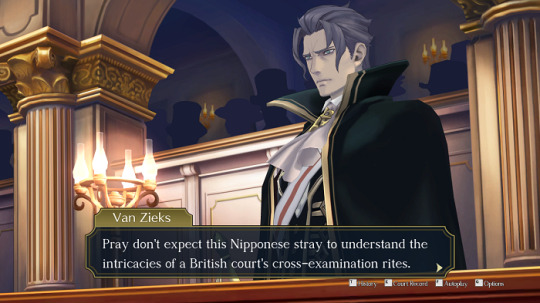
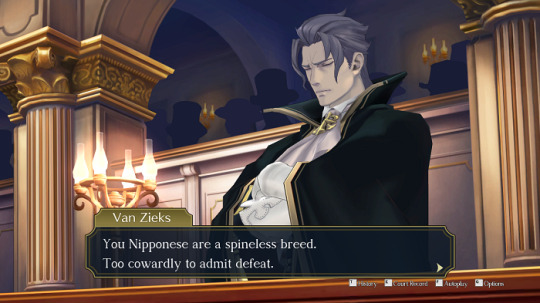
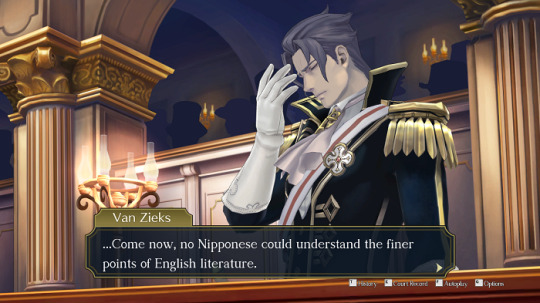
Etc. etc. I have many of these. We can all agree that as an antagonistic force, he does his job quite well. CEO of Racism and White Privilege in the flesh. It works, since we as the audience get very frustrated and want to see him defeated.
2) Humanization:
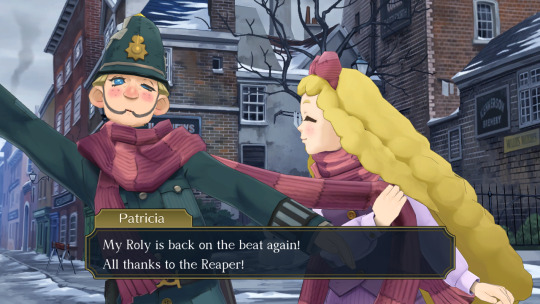
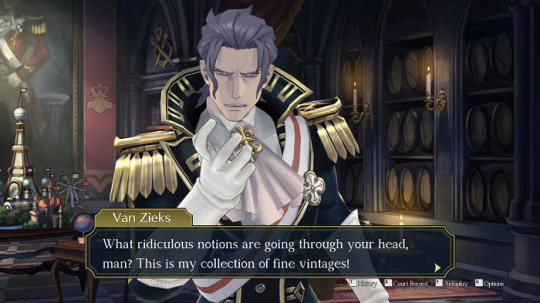
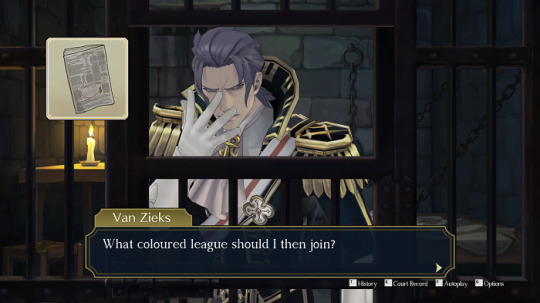
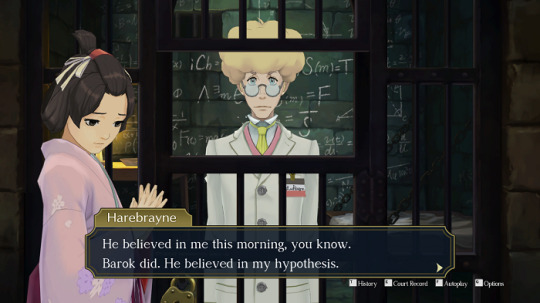
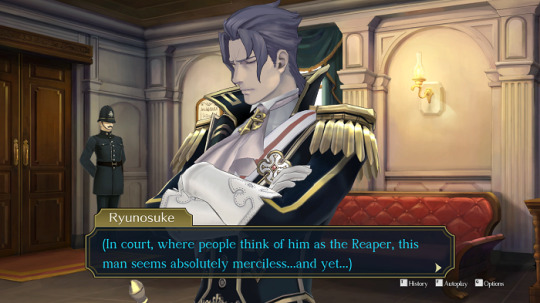
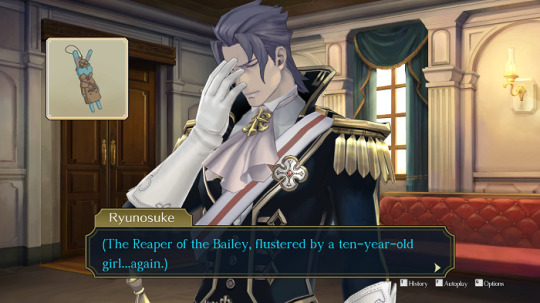
Giving him an old friend to be a defendant was a brilliant move, really. Albert's reflection on the friendship and the person Van Zieks used to be really helped flesh him out and make him appear more like a human being with, y'know, emotions and weaknesses. The little snippets of dialogue in his office really help too. Presenting evidence can also lead to fun tidbits. All in all, considering how gruff and distant Van Zieks is, they really did their very best to humanize him. The writers were given very little to work with but they exploited every opportunity to come their way.
OPTIONAL backstory:
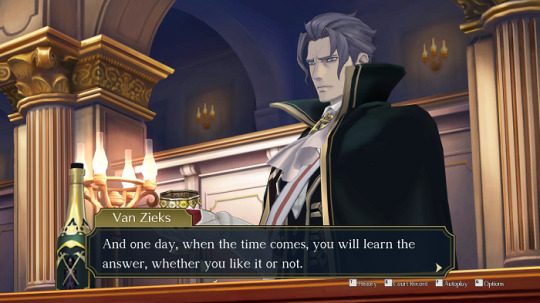
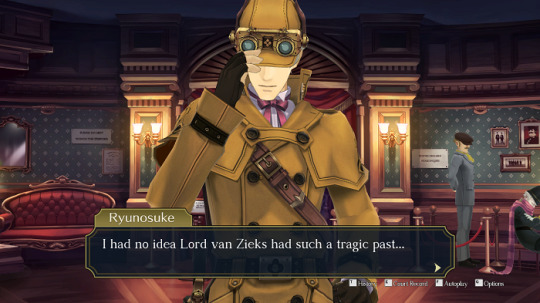
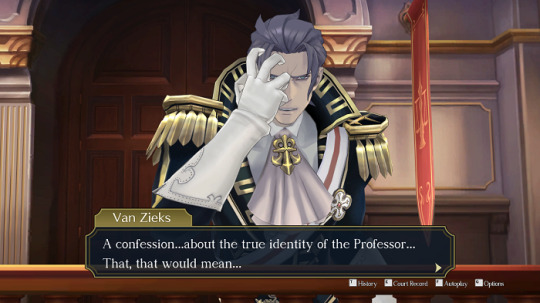
Again, I don't think we needed a tragic backstory to have a well-rounded, redeemable character. Still, it ties in very expertly to the game's plot and the motivations of quite a few other characters. The story of Klint van Zieks and his death isn't necessarily Barok van Zieks's backstory, it's the center of an intricate web which also holds Kazuma, Stronghart, Gregson, Jigoku, (S)Holmes, Mikotoba, Sithe, Drebber- I could go on. A LOT. So because of how very integrated it is into the main narrative's recurring themes and characters, I'll give it props for being relevant and well thought out.
The bigger question is: Does it justify his immorality? Not entirely. I think the game could have gotten more out of this if they'd involved the other two exchange students in this tale just a bit more. They could have given more attention to how Jigoku's aggressive behavior in the trial impacted Van Zieks, and explained whether he might've suspected Mikotoba of sabotaging (S)Holmes's investigation. If the narrative had done that, all three Japanese people to come to London would have been ‘the bad guy’ in Van Zieks's eyes and it would have given more credence to his racial generalization. They could have also given more attention to how the people around him reacted to Genshin being the Professor, because I'm sure Stronghart and Gregson stoked the fire in terms of xenophobia. As it stands, there isn't really enough there to justify hatred of an entire race as opposed to just one person.
3) Realization/Redemption
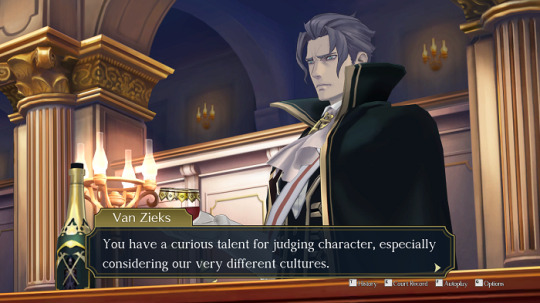
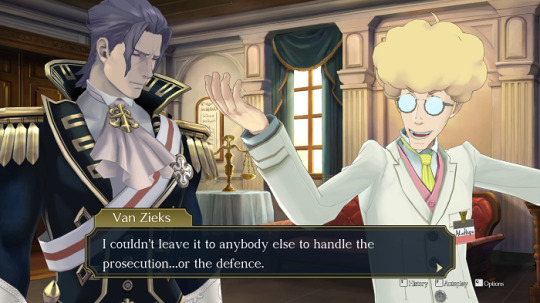
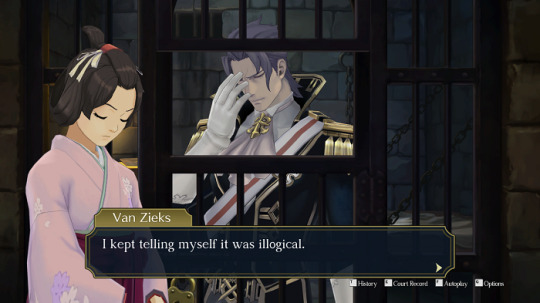
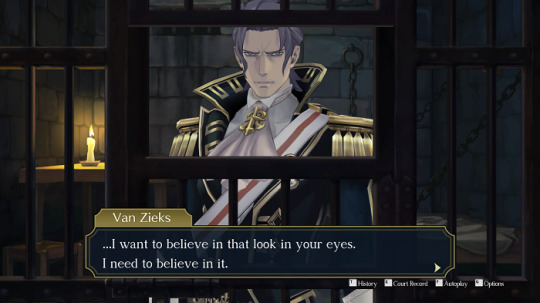
We see him already start to realize the error of his ways around the end of 1-5, which is technically only about halfway into the full narrative. Unfortunately, thanks to 2-2 being played afterwards (but chronologically set before 1-5), any progress made in 1-5 can become invalidated in the player's eyes. Growth works best when it's done linear. Don't get me wrong, flashbacking to earlier times when a character is still more morally tainted can work well, but it needs to be executed properly. Barok's behavior in 2-2 is downright insulting towards the audience itself and therefore, it causes emotional friction when relaying the narrative endgoal of redemption. It also makes it extra jarring when we hit 2-3, and suddenly Van Zieks is meant to be relying on the protagonist's desire to expose the truth. How on earth can we as the audience trust that Van Zieks believes in Ryu's abilities when we just came fresh out of a case where this man actively sabotages Ryu's efforts?
Still, the line of redemption continues from 2-3 into 2-4 well enough. He admits that he was wrong- that his hatred was illogical and that he needs to change. This is the very definition of redemption. I need to stress once more this is not to be confused with atonement, which comes next.
4) Atonement
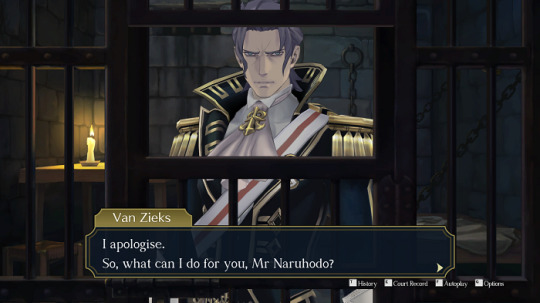
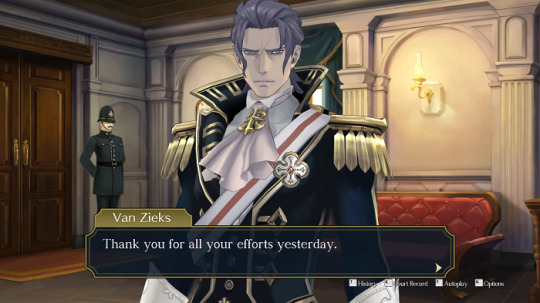
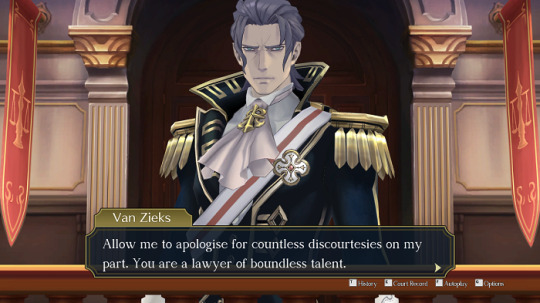
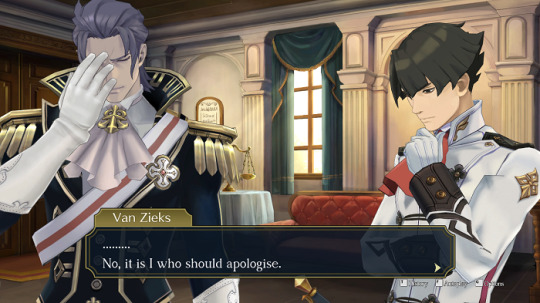
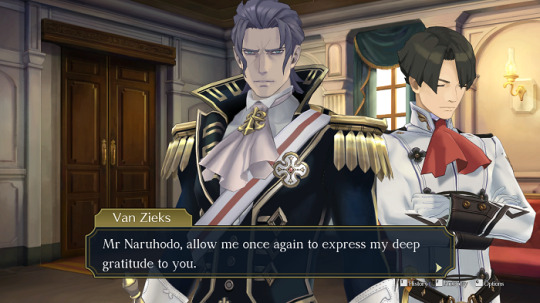
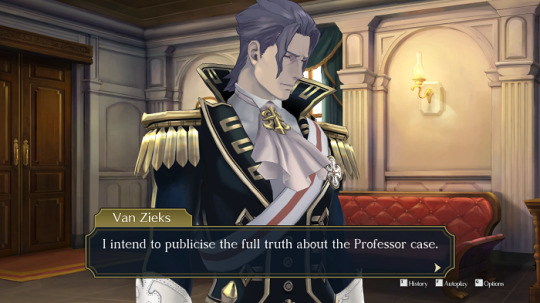
Here it is. It's not enough to simply acknowledge mistakes; one needs to work hard to fix them. Since Van Zieks is the defendant for two whole episodes, equaling roughly 20% of the full narrative and 67% of the time following his first true realization (chronologically), there isn't much that he can actively do to atone. Because remember, not only do these actions need to fit the situation he's currently in, they need to fit his personality. These two limitations ensure the atonement mostly takes the form of dialogue. Of apologies.
One might want to point out that he never apologizes specifically for his racism, but there's a reason for that. If you pay close attention, you'll notice that there isn't a single character who ever uses a word like “racism”, “xenophobia” or even “racial prejudice” in this game. It's for the same reason you'll never see an Ace Attorney character utter words like “alcoholism”, “drug abuse” or “depression”. These things may be implied very strongly, to the point where you'll know for certain a character is suffering from it, but it's never given these exact labels. It has to do with the tone of the game. In Great Ace Attorney's dialogue, Barok van Zieks is only ever described as holding “a deep hatred for Japanese”, which is then the only thing he could apologize for. And he does, so long as you aren't looking for a literal phrasing of “I apologize for my deep hatred of your people”.
Regardless, he can't take more active, decisive action until he's freed from prison and two scenes with Van Zieks later, the game has ended. He still manages to take two actions, though! The first is to publicize the truth of the Professor, taking the blame of the mass murders off Genshin's shoulders (and losing his own privilege in the process). The second is to take Kazuma under his wing as his disciple. I'm not certain there's anything else the narrative could have had him do. What is decisively missing, however, is the following:
5) Acknowledgment
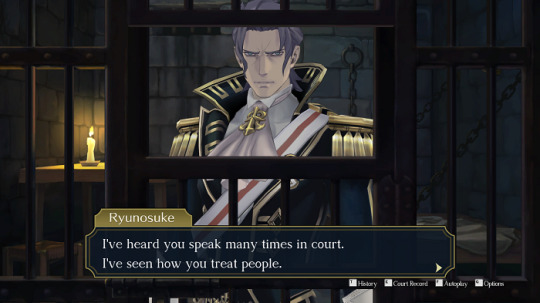
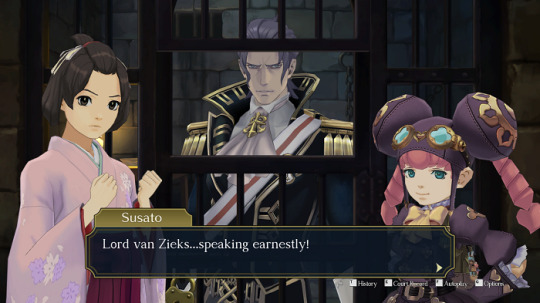
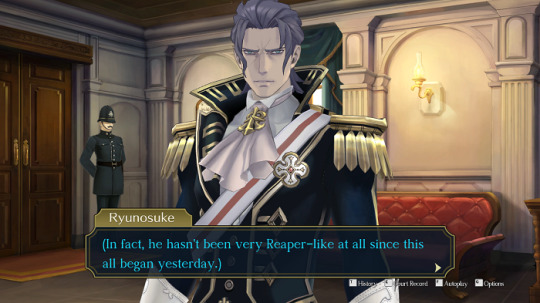
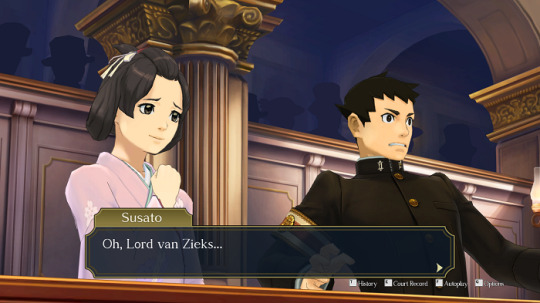
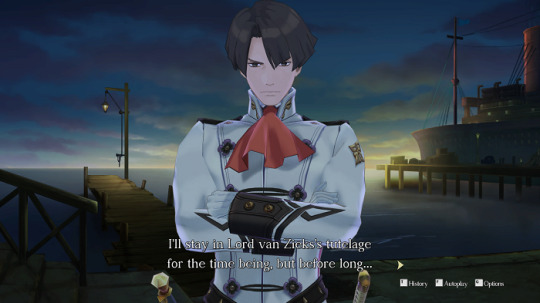
The above aren't good examples of cast acknowledgment that Van Zieks is taking part in a redemption arc, rather, they're the best I could find. Characters are acknowledging that he's changing- that he's being kinder to them and they can get along with him now, but they're not acknowledging that he caused hurt in the first place. This, in my opinion, is the Great Ace Attorney's biggest narrative flaw. I've talked before about how Ryu's reaction to Van Zieks's racism is 'indirect communication', a typically Japanese manner of dealing with negativity. I've also talked about how Ryu is not in a position to speak up, as he's a literal minority who is there to represent his country in an official capacity and can’t afford to make enemies. However, characters like Susato and Kazuma are far more outspoken in their opinions, as is Soseki. The only one who ever calls Van Zieks out on his racism is the British judge, and even that is done very meekly. When an old crusty white guy is the one who condemns white privilege in a cast full of minorities, you've got a problem. The Japanese cast's refusal to acknowledge that Van Zieks's words were harmful is like Team Avatar telling Zuko that sure, he can join since he's a good guy now, but never once acknowledging that he burned down villages or betrayed everyone's trust in Ba Sing Se. There's something very vital missing, see? If indeed the cast had called Van Zieks out more actively on his harmful ways and how necessary it was for him to change, he in turn could have taken more atonement steps in response.
So, for the conclusion: Does Barok van Zieks tick all the necessary boxes for a complete redemption arc? Yes. In a very technical sense, all the requirements are there. But does that mean it's a successful arc? Not necessarily. The game has a few slip-ups, a few things not executed as well as they could have been. For that reason, whether the audience is satisfied with the arc is entirely up to them. Taking into consideration that they had to cram a whole lot of story into just two games- the second game in particular, I can acknowledge they did their very best with the limitations that were there.
And there we have it! That’s all I could think to say on the matter. I hope everyone who read this till the very end enjoyed it, maybe even learned a thing or two. I’m always open to questions, input and constructive criticism!
#dgs#dgs spoilers#tgaa#tgaa spoilers#barok van zieks#I'M FREE!#well until I tackle the DLC content#but until then...#FREEEE
36 notes
·
View notes
Text
Let's Talk About NatsuMikan: The Anime (pt. 1)
I could go on and on about these two and I think I will, just because I don’t often see people talk about the analysis behind them. The meta I have seen about them has included a perspective that equaled the anime and the manga and I don’t think that’s an accurate way of viewing their relationship.
The anime is a different species than the manga, something that frequently happens during the adaptation from page to screen. Since they’re so different, I’ll analyze them separately.
There's going to be many parts to this so I'll keep a table of contents right here so people can more easily navigate (though you can also read through the "let's talk about natsumikan: the anime" tag on my blog):
Anime Analysis
Part 1: Exposition & Episode 7
Part 2: Episodes 8, 9, 10, & 11
Part 3: Episodes 12, 13, 14, 15, 16, & 17
Part 4: Episodes 18 & 19
Part 5: Episodes 20, 21, & 22
Part 6: Episodes 23, 24, 25, & 26 & Conclusion
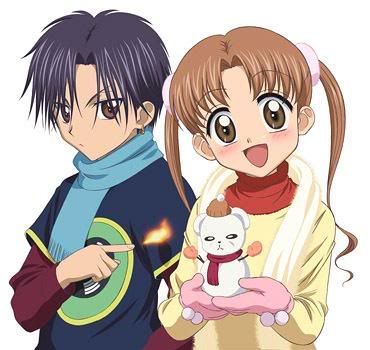
The anime makes changes, as anime adaptations often do. The most outstanding changes are appearance related, as Natsume now has brown eyes instead of red, in addition to other characters who have hue-shifted eyes and hair. But there are also story changes, and I’ll be focusing on the changes that occur, specifically in regards to Natsume and Mikan and their relationship.
For one, their relationship starts evolving much earlier in the anime. I think it’s pretty undeniable that in the anime, Natsume started liking Mikan at the end of the dodgeball game. That scene never happened in the manga, but in the anime, it’s a crucial step in making sure nothing seems too sudden or forced.
The anime is 26 episodes long. If Natsume only starts liking Mikan after she saves him during the Reo Arc, then we’re already halfway through the show when positive feelings between the two appear. On the other hand, the feelings develop more slowly in the manga because there’s more time to properly develop the relationship in a more drawn out way.
My analysis will start with the anime, because it’s shorter and easier to discuss.
Exposition
It’s impossible to say that the anime was completely loyal to the manga. It very frequently couldn’t be, because it needed to fill in time in episodes or give closure early before the manga even addressed it (Natsume’s backstory in the anime, for instance, is vaguely referred to and implies deviation from the manga).
The most obvious difference between the manga and the anime from the get-go is visual. Not only do they have differing art styles (I don’t dislike the anime style but Higuchi Tachibana’s art style is so distinct and unmistakable while the anime’s isn’t so unique), but the setting is also different.
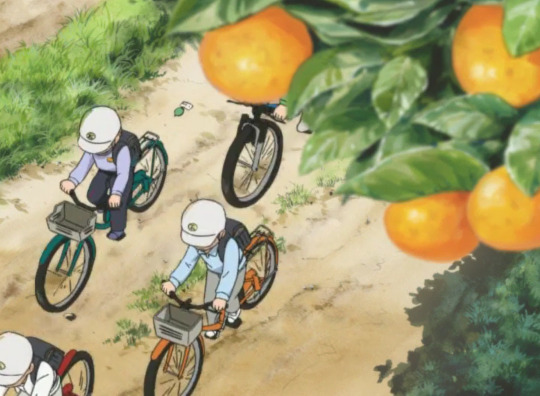
While the manga started in the depth of winter, the anime starts off in summer/fall. It always struck me as odd that while the first page of the manga has Mikan running after Hotaru in full winter-wear, the anime starts off warm and idyllic. You could almost think of that as a general warning for the difference between the anime and the manga. After all, while the anime has a reputation for being a cutesy and upbeat story about friendship and magical powers, the manga is much darker and discusses many morbid and depressing themes that can and WILL fuck you up. Warm vs. cold seems like an accurate difference, though I don’t think that was intentional.
We see way more of the village life in the anime, including Mikan’s efforts to keep the school from closing. This is a welcome change because Mikan’s passion to keep the school open is nothing compared to her friendship with Hotaru, and even after the school is saved, she runs away to see her friend, even if it means she goes to another school. The manga doesn’t imply that Mikan knew already about the school’s fate, and since she is always so preoccupied with Hotaru anyway, we don’t really get the impression that she cares very much. To Anime!Mikan, Hotaru is more important than saving the school, something she was so passionate about she rallied to get signatures. It’s an extra scene to prove just how much Hotaru matters to Mikan, and to show even more how selfless Hotaru was to go to Alice Academy, since she knew how much the school mattered to Mikan.

“Sign my petition to get a Gakuen Alice anime reboot!!!”
My boy Natsume is only introduced properly in the second episode, when we actually see his face and he speaks. His appearance is different from the manga’s too. I’m not sure if this was to appeal to a younger audience or what, but Natsume’s eyes are changed to brown instead of their iconic red, something that was always my biggest peeve about the anime adaptation. His hair is also somewhat purplish instead of entirely grey/black and, although this does bother me a lot less than the eyes, I wonder why they made this change when other characters have black hair. It might have been to differentiate him from Hotaru, another main character with black hair, though I’ve never had issue in the manga telling them apart.
His first interaction with Mikan is a lot more pleasant in the anime than in the manga, although that’s not really saying anything. Mikan’s skirt simply falls off and Natsume draws attention to it, rather than the unpleasant events that took place in the manga. This different event makes it a lot easier to support a relationship between the two of them right off the bat. They are still antagonistic but it’s not as terrible as it is in the manga. This makes it easier to establish romantic feelings earlier on, and might have been changed in order to achieve just that, or possibly also to appeal to a younger audience. Maybe both? Who knows.
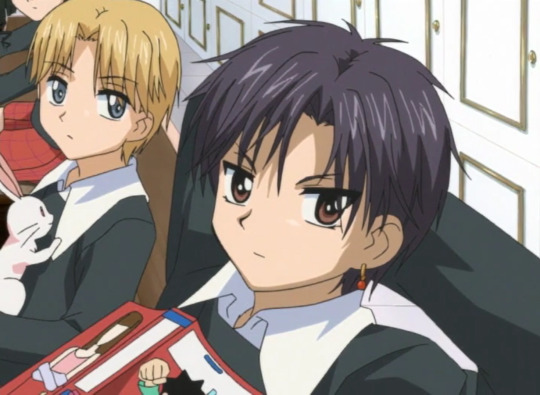
“You can’t sit with us!”
With Natsume presented the way he is in the anime, it’s easier to make the claim that he’s simply a good guy who acts the way he does to protect people. And it’s true! He is! But he is also so much more. In the manga, he’s a more complicated character. Although he is a good person, he still requires character development, which is something he does go through, and something I’ll talk about more in his meta analysis later.
Most of the events at the beginning of the anime parallel the events of the manga. Mikan goes to Alice Academy at the same time of year, Natsume shows up with an explosion, Mikan has to go through the Northern Woods, she discovers her powers in her fight with Natsume, etc. Some of the continuation from episode to episode is different than the transitions between chapter to chapter, there’s extra scenes inserted to fill up time, and some of the exposition seems strangely presented (in the anime, Mikan finds out more about the school when she finds Narumi and Iinchou waiting for her at a tea party, which is…. Super weird…), but all in all the information and events are mainly the same. The big differences start with the dodgeball episode.
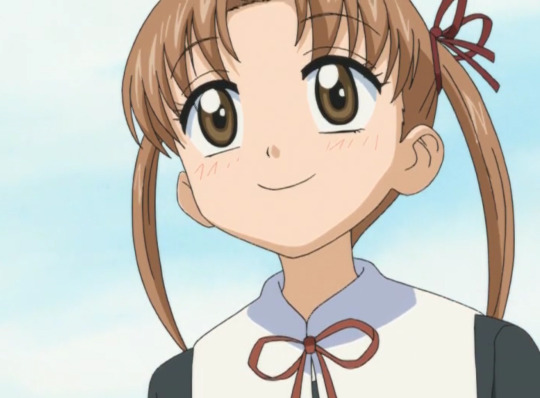
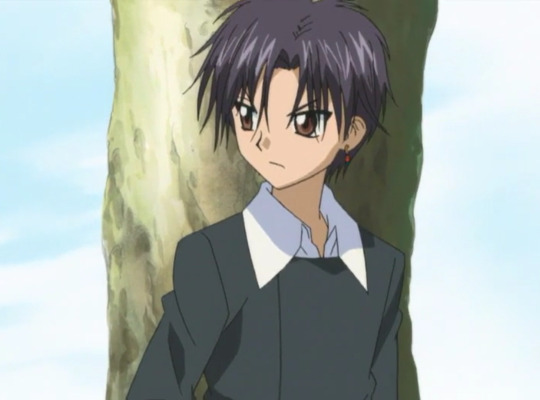
“Look how happy she is. Makes me wanna barf.”
Episode 7 vs. Chapter 9
I love the dodgeball episode. I feel like for the most part, the anime does deviation from the manga pretty well. With the last arc as an exception, I generally enjoy their changes and additions to the plot. The anime has to be different, has to progress at a different pace, has to introduce topics at different times. They have an episode to fill, and less time to build relationships. Natsume and Mikan are both different characters in the anime but it’s very subtle and has to happen due to the fact that the anime is shorter and seems more designed for younger audiences, in addition to wrapping up before the manga could explore more of the story.
Anyway, let’s talk about the dodgeball episode. AGAIN THIS DOES NOT HAPPEN IN THE MANGA THE SAME WAY so when discussing NatsuMikan as a concept, the anime events cannot be treated the same as the manga events. A lot of people maybe forget that the manga is very different than the anime when it comes to this episode. I see the two media conflated in plenty of fanfics, where seventeen year old NatsuMikan reflect on the dodgeball game from their youth that changed everything, and I get it because the anime version of the dodgeball game is cute! It's shippy! It's fun! But it doesn't happen in the manga the same way.
There's a similar trope with the sakura tree, which I can only remember from the anime, and yet it's such a fundamental aspect of NM fanfic it might as well have played a vital role in both anime and manga. Nothing wrong with any of this, of course. I'm just making it clear that my analysis will cover the two media as separate for the sake of a cohesive essay. Separating them in fanfic is far less important.
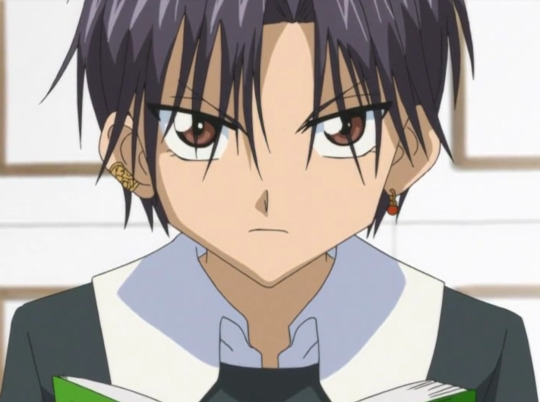
This look could probably kill someone. I’m surprised Mikan is still alive, TBH.
The chapter’s focus is Mikan starting to feel more at home in Class B, making friends with her once-hostile classmates, but the episode is more preoccupied with Natsume and Mikan’s perspectives on each other. While in the manga, the game ends with a tie and Mikan accidentally hits Hotaru in the face with the ball, the anime draws out the game to fill an episode and to introduce an evolution in the way Natsume sees Mikan. The first part of the anime episode is Mikan introducing her friends to her new senpai, Tsubasa. After she invites her friends, we see Natsume glowering at her and promptly ditching the next class, saying to Ruka that he can’t stand being in the same class as her. This addition to the plot already foreshadows that their relationship will change in some way by the end of the episode.
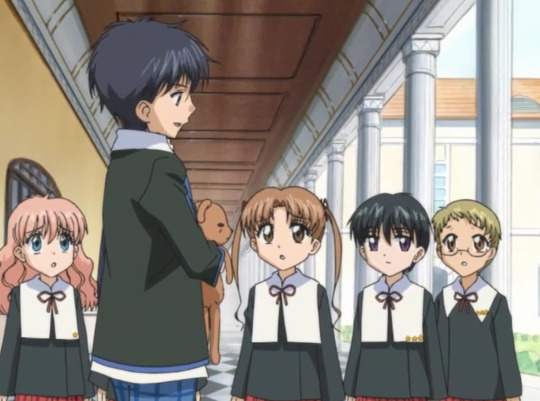
Tsubasa tells a frustrated Mikan that if she wants Natsume to be less unpleasant, he’d need to release some of his toxic energy. Thus, the sporty Mikan introduces the concept of dodgeball to the unwelcoming class. When they finally agree, Natsume gives one condition: that they play with the notorious Alice Ball, which is powered by the thrower’s alice (a detail absent from the manga). This Alice Ball is particularly terrifying with the threat of Natsume’s dangerous fire alice. Mikan also needs to get more people on her team, another aspect absent from the manga. While in the manga, Mikan only had her few friends on her team (including a wandering Ruka) and this ended up playing to her advantage, the anime has a humorous plot of Mikan tracking players down for her team, including a fake mustache she makes with her pigtails (she’s so cute, I love her), paying Hotaru to be on her team, and blackmailing Ruka to participate. This was mainly to fill time, but it makes the dodgeball game more important as well.
In the manga, we don’t see how the game ends, just that the teams tied and that everyone in class is having fun and bonding. In the anime, more emphasis is put on the “Mikan vs. Natsume” aspect, so a tie like the manga’s would be anticlimactic. Thus, the anime concludes the dodgeball game with Mikan and Natsume being the only kids left on the court, and Natsume not using his alice when he throws the Alice Ball. Even Hotaru leaving the game is something she does out of boredom instead of injury, further separating the other characters from the plot. It’s about Natsume and Mikan, and everyone else is mostly a side character. (Though Ruka also plays a vital role to this episode AND chapter, and it’s at this point that I think he started developing real feelings for Mikan as well. So when it comes to the anime, he and Natsume fall for Mikan around the same time, but in the manga, Ruka likes her first and the “he liked her first” argument for Natsume vanishes, though he never had that “advantage” to begin with.)
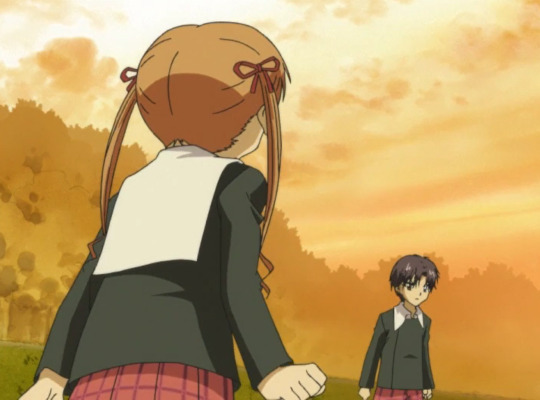
“Thank you!”
Natsume wins (something that shocked me at twelve years old) and is ready to walk away with his handy “tch” and all but Mikan thanks him for not using his alice and he goes off on her, demanding to know why she’s still smiling despite her loss. She says she’s happy that he had fun and was involved with the rest of class for once, and that in a way that means she wins. For Anime!Natsumikan, this is it. This is the turning point. “I just wanted you to be happy and have fun,” is what Mikan might as well be saying. “Really, this was all for you!” It’s sweet and it’s thoughtful and I don’t think Natsume ever imagined he’d be on the receiving end of her kindness, especially after all their beef. Manga!Mikan would probably not say these things to him, even if she meant them, for the sole reason that Mikan is stubborn and holds onto her pride, especially when it comes to her early relationship with Natsume, but Anime!Mikan is much more forgiving and much more willing to extend an olive branch, like in the dance episode. In any case, Natsume starts falling right then, and it’s obvious too, because he is pissed, and even more angry because he’s not even mad at her. He’s angry with himself for his change of opinion. This is the girl he was fully content to hate forever and yet here he was, starting to like her. Not ideal.
This scene, something so crucial to the development of Anime!Natsumikan, is completely absent from the manga. In the manga, Natsume still dislikes her by the end of the game although he does have fun.
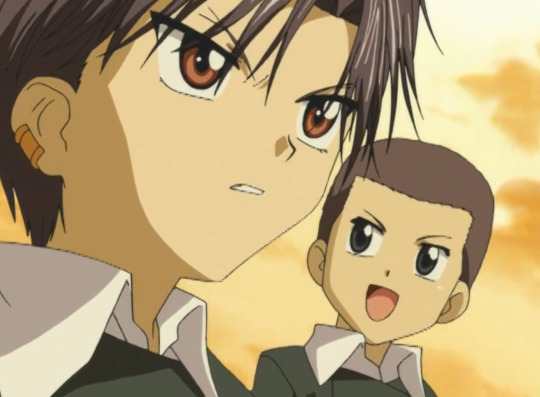
He's not angry, just disappointed. In himself.
I’m not going to say one is better when it comes to starting up NatsuMikan because they’re very different creatures and I actually thoroughly enjoy both.
Anyway, the NatsuMikan after episode 7 is almost the same as in the manga, but the events carry a different weight since we know Natsume likes Mikan now (even if he would never admit it).
Summary
I hope this first part was interesting, and that it introduced the idea of Anime!NatsuMikan as being a little different from the manga's version. Yes, it is more or less the same story, but with so many thematic and plot changes, they take a different form as well, in a perhaps more subtle way, kind of like a slightly canon divergent fanfic. Fanfic where Natsume starts liking Mikan a bit earlier on in the story.
Next Part ->
#gakuen alice#alice academy#natsumikan#hyuuga natsume#natsume hyuuga#sakura mikan#mikan sakura#meta#my meta#ga#meta analysis#mine#ga meta#ga meta: anime nm#let's talk about natsumikan: anime#im trying to create a system from one post so let's see how it goes#ive never posted media analysis like this but im very excited to bc ive always wanted to analyze these kids <3#unfortunately due to tumblrs image post limit of 10 i had to split this into MANY parts#im a visual person and i know others are too#if these images are not sufficient then i would rec maybe rewatching the eps after reading or maybe just skipping through the eps#u might some find some changes and themes of note as well to add and that would be super fun!#ga meta: nm#let's talk about natsumikan
49 notes
·
View notes
Text
Hermione as Harry's Light (by Evaluna)
Hello! This is an essay written many years ago, before the release of HBP&DH. It doesn't belong to me so credits to the original writers(Evaluna, Turambar & Mad-I Moody)! It was written on the CoS forum, I'm not sure if it's still saved there but I have a word document with all of the essays. Anyways, this essay has no ship/character bashing. Again, this essay isn't written by me, but it's one of my favorites. Enjoy!
Quote by Mad-I Moody:
"1."Ron's mum's lit a fire in there [Harry's bedroom] and she's sent up sandwiches." -Hermione couldn't know that if she had immediately dashed up to Harry.
2. "Ron and Ginny say that you've been hiding from everyone since you got back from St. Mungo's." - She's obviously talked to them about this at some point between their arrival back from the hospital and her arrival at 12GP.
3. "The others have told me what you overheard last night on the Extendable Ears."
-Does this indicate that she's had time to talk to the other members of the Weasley clan? Sources point to yes!
Now, isn't it sensible to assume that, in the instances wherein Hermione talked to the Weasley family, she was, at least, thoughtful enough to ask about Mr. Weasley?
Saying Hermione came only to be with Harry cannot be true therefore, because:
1. She doesn't go to see him the MOMENT she comes through the door
2. She gets Harry right out of the sulking room and takes him into a room with Ron and Ginny, with whom she has quite obviously been talking.
3. There is no indication that she wants to be alone with Harry"
Mad-I: Disagree. Not just from a textual analysis standpoint; there we have each our own interpretation. My strongest disagreement comes from what I see as a critical ���septology’ issue [overarching theme of all 7 books]: Harry overcoming his own internal darkness [despair, hopelessness, isolation] before able to wage and win [or overcome] the external darkness [Voldy, evil, fear, hatred and division]. See below post. IMO the Hermione as Lifeline or Light for Harry scene is representative of what Harry must confront and for what he must stand and fight:
--darkness and the battle of good over evil,
--despair [depression] and the battle of love over [here, self-] hatred,
--isolation and limitation [e.g., Harry imposes on himself a prison for his mind], and the battle of love as emanation over barriers, constraints, and perceptions
It begins with himself. And IMO it doesn’t end. But anyway, it progresses from there to encompass the world. On his own, this scene shows that Harry is vulnerable in that he needs a source of love [for himself] to sustain him; only then can Harry be a source of love [for the world] in his [upcoming and perhaps ongoing] battle with darkness. Harry needs love in this regard perhaps more than anyone else in the world, and yet he’s had very little of it, with Sirius mostly kept apart from Harry. Except for Hermione, who has always been there for Harry? With Hermione’s return, once more for Harry there is connection and hope, and the belief in unlimited horizons and potential - some would call it faith -- when with Hermione. For ship and for series, IMO, I believe that Harry’s ability to acknowledge his need for love [for me, this means for Hermione] is the first step on his path to the light.
What the scene does imply is that Hermione’s conversation with Ron and Ginny and the others’ [may include Fred and George as well] was extremely brief and in the majority focused firmly on Harry. So brief in span that the snow had not yet melted even after climbing the stairs and so focused on Harry and his situation that Hermione had the grasp on all the main details already when she first pounded on the door. This is a young woman on a *mission*. A mission to save Harry. Hermione reaches Harry and saves him from himself, from his dark side, from his own personal hell. I personally think this is one of the most critical scenes in the book for Harry and his battle for good over evil, probably the most important one. The battle is within as well as without, and Hermione is the bringer of light to balance his darkness, to bring balance to his soul AK and Earendil:[thanks for SF ref!] a soul is a universe in and of itself <kabbalah, so one could say Hermione is bringing balance to the universe, in this sense]. Some may say it is not romantic..er…well…to each. But it can certainly be argued that the light and dark imagery, in bringing light from darkness, in the balance they provide one another, in the give and take [in interactions, in providing insight [in this scene=hers/giving love to him through her actions when she comes] or providing courage [in this scene=his/accepting her love through his actions when he follows] between them are the yin and yang that represent in both religious and esoteric texts the love on many levels required for spiritual completion of the marriage of two [bodies and souls] as one, separate but together [again, see the smoky caduceus-like vision that Dumbledore views after Harry’s vision prior to their arrival at number 12, which is followed shortly thereafter by the arrival of Hermione.
With this, one can make a case for striking symbolic romantic and platonic love imagery simultaneously, as well, in terms of a soulmate love that is “complete” on an esoteric level, a bonding of body and soul, the material and spiritual. I see no inherent contradiction, probably because I’m not an ancient Greek philosopher named Aristotle. [‘What is a friend? A single soul dwelling in two bodies’. --Aristotle] The difference being that we in our day can allow for this kind of soulmate love
between a man and a woman, as well, and that we can allow love to exist on many different levels between a man and a woman, not just Eros or what the Greeks narrowly defined as romantic love. The esoteric concepts of a true bonding of souls between a man and woman did of course contain all of these forms of love, sealed with emotional, physical, and contractual public commitments intended to represent the bonding of two souls as one before God and heaven. IMO how can this scene not be important for Harry, particularly as we all know that love is critical to overcoming all that Voldy is and represents? And whatever type you feel exists them between them, IMO there is deep love. So in fact I think this can be argued strongly as a H/Hr scene. For those who disagree, nonetheless it’s all-good since a deep soul love exists regardless if it is ‘very’ platonic. This is, after all, just a hair’s breadth from ‘total consciousness’.
One more point I mentioned before that I want to bring up in context of reinforcing Hermione’s critical position as Harry’s Light, Lifeline, or Savior. Arguably, since Hermione is key to bringing Harry back from the edge [regardless of what comes later], IMO the larger symbolism is that Hermione is “the one” who will always save Harry from his greatest enemy - himself, his dark side. After that, and only after that, can Harry save the world. She will help him choose light [represented by…Hermione] over darkness [his own despair and hopelessness, his feelings of being unclean and unworthy]. Even I can see some traditional religious symbolism here, but there’s much esoteric symbolism as well. Nonetheless, Ron’s gift of…what, frankincense and myth? Is that why the perfume smelled unusual?... Ron’s gift only seemed to highlight his deeper, intuitive understanding [at some level] of Hermione’s fundamental importance to Harry. Yin and Yang. Inexorably intertwined - just thought I’d throw that in here as well! And for what purpose would Ron is shown as gifting her with such symbolic honor if not to perhaps choose to give his life for hers, thereby saving Harry’s light and thus saving them all. Particularly, if Ron betrays or obstructs Harry and Hermione [this may happen if Ron is rejected by Hermione or “loses” her to Harry, per 6th step scene, falling away from the path to Hermione's door], then Ron may sacrifice himself [from betrayal guilt] to save Harry and/or Hermione [same scene, where Ron falls at Harry's feet] thus restoring his character and his legacy in addition to doing his critical bit to save Hermione &/or Harry [=the world].
(Turambar) I agree that the Christmas scene is one of the most significant in the book.
Just on what you said about the light/dark: it's interesting that JKR accentuates the extremities in various ways to bring out that contrast.
She uses biblical language - appropriate considering the timing - such as "unclean" and "possession" to describe Harry's self-disgust. His feelings of being unfit to be in the company of others brings another biblical image of the leper.
He completely isolates himself for a period rather than just behaves in a moody/angry fashion in company. He's "starving", cold.
Hermione is not mentioned at all from the time of the dream to her knocking on his door - an obvious device to enhance the surprise and impact of her arrival.
There's the imagery of evil (snake) and love (hippogriff) and as I've said before that suspicious dream occurs just when Harry is at his lowest ebb.
I agree with what FP said: the sequence shows the limitations of his relationship with the Weasleys and Sirius and conversely the growing significance to him of Hermione.
Both times he's considered running away when in a depressed state - here and before the First Task - the option has been to run to the barren, loveless Dursleys. To the house that's not a home and the family that isn't a family (to him). Both times he's got through the bad patch with a bit of help from Hermione.
#harry potter#harmione#harmony#harry and hermione#harry potter ships#hermione granger#hp ships#harry x hermione#harry/hermione#hermione and harry#hermione x harry#hermione/harry#harry potter series#harry potter books#hp#hhr#harry potter essay#harmione essay
49 notes
·
View notes
Text
WangXian wouldn’t have been very functional pre-Wei Wuxian’s resurrection
So I was talking to @litescheme on Twitter and I decided to pour my heart out about how I hated the general fandom consensus that Wei Wuxian going to Gusu when Lan Wangji asked him to would have solved all of his problems, primarily because the idea of just straight up going to Gusu is incredibly flawed. Lo and behold, they agreed wholeheartedly. We had a great discussion and now I’m here to relay the discussion onto Tumblr in essay form uwu.
(By the way, this is based mostly on CQL with a good bit of novel added in, as well as a few hints of the donghua.)
Part One: “Come back to Gusu!” is a great romantic notion but a terrible plan of action.
First of all, one must ask the question: what on Earth was Lan Wangji’s game plan with the whole “Come back to Gusu!” thing? I think we can all agree that most of the Lan Sect hated Wei Wuxian - by the end, at least. Lan Xichen certainly had less than charitable feelings toward him. With such a hostile environment, the only way I can see Wei Wuxian surviving within the Sect is while being forced into a Madam Lan-type situation. I find that prospect more reminiscent of a horror movie than a heartwarming fic about healing.
Luckily for us, we can safely say that canon Lan Wangji would not have done that! Due to certain childhood trauma, Lan Wangji definitely would not have forced Wei Wuxian to do anything, go anywhere, or stay anywhere that he didn’t want to. That isn’t even touching on how much Lan Wangji genuinely wanted Wei Wuxian to be happy, and forcing Wei Wuxian to do anything had generally been proven to not make him happy. Good on him!
The next point: why would Wei Wuxian have gone to Gusu in the first place? Even while ignoring WangXian’s rampant misunderstandings, Wei Wuxian always actively had a reason to not go to Gusu. During the Sunshot Campaign, he was a major player and commanded a huge amount of power that probably aided the Sects greatly. During his stay in the Burial Mounds, he had a community of war prisoners to protect. How could he go to Gusu?
I’ve seen fics where Lan Wangji ensured the safety of the Wen Remnants, and while I absolutely adore the trope, I really don’t see that happening with canon Lan Wangji. First, I don’t think he’d grown as a person enough to fully rebel against his Sect until Wei Wuxian was in immediate danger, and second, I straight up don’t think that he had the sway to. Pulling that kind of stunt implies a good deal of political power within the Sect...and also implies that Lan Wangji would have had enough power to escape a punishment which he clearly never thought he deserved. However, I could be wrong on this point! Politics has never been my forte.
Also, I don’t think anyone can bank on the Lan Sect accepting the Wen Remnants. After all, the Lan Sect participated in the First Siege of the Burial Mounds and thus, presumably, also the slaughter of the Wen Remnants.
Upon further reflection, I figured that the only time Wei Wuxian might have actually gone to Gusu was that brief period of time after the Sunshot Campaign and before he met Wen Qing. However, for him to agree, I figured that three things had to happen:
Wei Wuxian had to understand that Lan Wangji wanted to help him, not hurt him.
Wei Wuxian had to come to the (false!) conclusion that Jiang Cheng no longer needed his help or support at Lotus Pier.
Wei Wuxian had to accept that he was worth saving in the first place.
(The concept came pre-set with some delicious Yunmeng Bros angst because Jiang Cheng would almost certainly take Wei Wuxian (permanently) going to Gusu the same way he took Wei Wuxian taking the Wen Remnants to the Burial Mounds: a betrayal, a promise broken. Emotionally, of course. There definitely wouldn’t have been political pressure closing in from all sides the way there was in canon.)
I was going to expand on that concept, but then I hit a bit of a hurdle: I genuinely did not, and still do not, see any reason for Wei Wuxian to actually go to Gusu. At that point, Wei Wuxian was doing everything he felt he needed to: he protected Jiang Cheng because Madam Yu told him to (and because he genuinely cared for him, but Madam Yu’s command was his driving force) and he only left Jiang Cheng when Wen Qing - someone he perceived himself owing a greater debt to due to the golden core removal - came along. When looking at it from that regard, I don’t think Wei Wuxian would ever see a reason to go to Gusu.
So, even after clearing up the miscommunication, Lan Wangji would have to present a good reason for Wei Wuxian to listen to him.
I don’t think Lan Wangji going up to Wei Wuxian and saying, “Please come back to Gusu, I want to protect you,” would have worked. Considering how prideful Wei Wuxian was back then - with a good bit of it justified when you consider the fact that he killed a large amount of people in a single night during the Pledge Conference (though the exact number is never actually confirmed as far as I remember) - I don’t see Wei Wuxian taking the implication that he needs protection very well. No matter how many good intentions Lan Wangji had, he would have ended up offending Wei Wuxian at that point.
Another route Lan Wangji could have taken: “Please come back to Gusu, I want to play Cleansing for you.” Again, I don’t think this would have worked. (At least, that was definitely his stance in CQL and Wei Wuxian still didn’t do anything.) In Chapter 78, Wei Wuxian mentioned that the Sound of Lucidity had no effect on him. The Sound of Lucidity is, presumably, one of the Song(s) of Clarity, of which Cleansing is the most powerful. Lan Wangji used the Sound of Lucidity at the Pledge Conference after the battle had started. I don’t exactly know why he didn’t use Cleansing when it was more powerful... Either way, after he played the Sound of Lucidity, Wei Wuxian said, “You should’ve known since long ago—Sound of Lucidity is useless to me!” Thus, Lan Wangji asking him to go to Gusu so he could play Cleansing probably wouldn’t have seemed like an especially compelling reason to Wei Wuxian.
After some thought, I figured that post-resurrection, Wei Wuxian agreed to stay with Lan Wangji in the Cloud Recesses after the mystery was solved because:
He was not as prideful as pre-death Wei Wuxian.
He saw no reason to go back to Lotus Pier since Jiang Cheng made it very clear that he was unhappy with him.
He managed to process and confess his feeling to Lan Wangji, who did the same.
Pre-death Wei Wuxian has none of this. Basically, Wei Wuxian at that point had no reason to go to Gusu for anything other than a short visit.
Now, I don’t know if any of you have noticed, but this entire time I’ve been ignoring not only the reality that Wei Wuxian and Lan Wangji’s relationship pre-death was...very bad, but also something else very important: the Stygian Tiger Seal.
The Stygian Tiger Seal was, of course, stupidly powerful, and Wei Wuxian only kept it because it would take too much time and energy to destroy, and it was meant to deter anyone from attacking him since he already knew that so many people were against him. One of his main fears was someone else - someone with impure motives - getting their hands on it, so of course he was paranoid wondering who would try to steal it from him. Lan Wangji asking him to go to a place where Wei Wuxian would be surrounded by people who hated his form of cultivation? Yeah, that didn’t sound that great.
(Also, can we please take a moment to appreciate this excerpt from the novel: “The Stygian Tiger Seal’s powers were considerably greater than what he had imagined. He originally wanted to use it to assist him, but its powers were almost exceeding him, its creator” (Chapter 30). Almost. He said the Seal was not as powerful as him! The Stygian Tiger Seal was, indeed, strong, but he was more so! I see a lot of fanfics paint the Stygian Tiger Seal as what made him so terrifying and...it was certainly a part of it, but he did most of it on his own! Ah, we love terrifying main characters~)
Now, I’ve acknowledged the existence of WangXian’s miscommunication, but I’ve never actually addressed it. So, here it is: I do not think Lan Wangji confessing to Wei Wuxian (even before his stint in the Burial Mounds after the Bloodbath at Nevernight) would have gone well. In Chapter 2, there is this excerpt: “Wei WuXian’s eyebrows twitched. Not only a lunatic, a homosexual lunatic as well.” This requires a bit of interpretation because it’s not exactly clear what Wei Wuxian’s eyebrow twitch means, but I’ve always interpreted it as annoyance - or even disgust - at the addition of “homosexual” to Mo Xuanyu’s profile. I’m not saying that Wei Wuxian was necessarily homophobic before the entire events of the novel, but I sincerely don’t think Wei Wuxian would have appreciated Lan Wangji - or any other man, for that matter - confessing to him. If even (immediate) post-resurrection Wei Wuxian had that attitude, I can imagine what would have gone through pre-death Wei Wuxian’s head.
So, Sunshot Campaign, post-Sunshot Campaign, and Yiling Patriarch Wei Wuxian would all definitely not go back to Gusu, nor would they appreciate a confession from Lan Wangji. That leaves the question: what about pre-Sunshot Campaign Wei Wuxian?
Part Two: Why I really don’t think WangXian would have worked out pre-Sunshot Campaign.
From here on out, “Wei Ying, come back to Gusu!” is no longer relevant because, well, Lan Wangji never said it before the meeting in the supervisory office. (And I think I’ve made my point regarding that as well as I could.)
Starting with Cloud Recesses-era Wei Wuxian...I think that, out of all the different versions of Wei Wuxian, he would have been the one of the two most-likely to get together with Lan Wangji (pre-resurrection, of course). Even then, I don’t see that high a likelihood of that actually happening. Why? Repression! Fuck both Wei Wuxian and Lan Wangji were so deeply repressed at that point! Lan Wangji was obviously more aware of his feelings, and Wei Wuxian...I don’t know, I haven’t read the novel far enough to actually have this be a legitimate interpretation, but looking at CQL, I don’t really think Wei Wuxian was in love with Lan Wangji at that point (but I don’t have much evidence to back that up other than my a-spec radar...).
And even if they did somehow manage to overcome their repression - and actually both had feelings for each other in the first place - they were still teenagers! Fifteen at the beginning, I’m pretty sure, and fifteen-year-olds are decidedly bad at maintaining any sort of relationship. That doesn’t even touch on the fact that WangXian was probably legitimately incompatible at that point. Lan Wangji still lived and breathed the rules and Wei Wuxian didn’t give a fuck about them. To maintain any sort of long-term relationship, they’d have to simultaneously undergo a whole novel of character development...which is doable! But! I don’t exactly see it as plausible.
Then, of course, Wei Wuxian got kicked out of the Cloud Recesses and WangXian didn’t see each other until two years later, at the Discussion Conference in Qishan. I don’t really see long-distance relationships working out very well in ancient China, so I can’t imagine them properly maintaining their relationship throughout that. And, of course, Lan Wangji’s rage after Wei Wuxian pulls his forehead ribbon was also due to his repression. Considering how short the Discussion Conference seemed to be, I don’t think there was much room for a relationship to develop.
At the Indoctrination Camp, Lan Wangji had a whole swarm of things to worry about other than his (frankly painful) pining for Wei Wuxian so, again, I don’t see a romantic relationship developing at that point in time.
A time-frame that I think can be uniquely isolated as a very possible place to develop their relationship would be while they were trapped in the cave with the Tortoise of Slaughter. Mostly before they killed the beast, though, since afterward, Wei Wuxian had too much of a fever for any romantic shenaniganry. My reasoning is that the cave was the first time since Wei Wuxian’s punishment in the Cloud Recesses that the two of them were forced to spend a long stretch of time together, and thus could potentially open up to each other. I remember in the anime that Lan Wangji sheds a few tears as he mentions that the Cloud Recesses had burned, that his brother was missing, and that his father was...dead? Severely injured? One of those two. He was back in business-mode pretty soon afterward, but if Lan Wangji could have been persuaded to open up a bit more by an persistent and concerned Wei Wuxian, I can see a slow confession being teased out of him - there was certainly enough time!
Then again, them getting together would only happen if Wei Wuxian were both comfortable with the idea of gay men and willing to accept that he was, in fact, attracted to Lan Wangji, and if Lan Wangji were willing to let go of the rules enough to be comfortable with Wei Wuxian’s naturally rebellious nature.
After that, WangXian doesn’t meet again until the supervisory office, and I’ve already talked about all of that.
In conclusion, “Come back to Gusu!” was sweet but misguided and WangXian wouldn’t have effectively happened pre-resurrection.
Now, what does that mean for you? ...Nothing. Absolutely fucking nothing. This doesn’t mean I’m forsaking all fics where WangXian gets together pre-resurrection (in fact, I absolutely love them!) and I’m definitely not trying to say that my interpretation is the only right one. I’m not trying to police what everyone thinks and decree that all fics where Wei Wuxian is open about liking men are wrong or any crap like that. Those fics are great and I love them! These are my (and @litescheme’s) thoughts on the matter that I (we) wanted to spill out into the greater world! You can agree, you can disagree, you can ignore me (us) entirely! But if you read through this meta, then I’m assuming that you found the concept interesting. That is all I was going for!
(Well, that and trying to thoroughly debunk the notion that Yiling Patriarch Wei Wuxian getting shoved into seclusion in the Jingshi by an apologetic Lan Wangji would be in any way “healing” or even “good” for Wei Wuxian, because honestly? Fuck that.)
Ahh, thanks for reading!
#is this a hot take?#you bet ya#do i care?#not anymore#litescheme i hope this lived up to your expectations ;-;#wei wuxian#lan wangji#wangxian#mdzs#mdzs meta#wwx#lwj#wei ying#lan zhan#feel free to ignore if you disagree!!!#i'm not gonna force you to read it
143 notes
·
View notes
Text
Angel
F/M Pairing: Y/N x Johnny Seo (NCT)
Warnings: Language, some mentions of smut
Genre: Married AU; Family AU
Word Count: 2.1K
Summary: Y/N has a good life. She’s married to her high school sweetheart and she has two amazing kids. However, even she has days where this whole quarantine thing really starts to take its toll.
A/N: Johnny said he’d be married with kids by now, so I made it happen fictitiously.

Angel
It was morning again, and I reluctantly opened my eyes to the familiar chime of my alarm. I released a groan, reaching over to silence my cellphone while ignoring the familiar sounds of footsteps in the hallways.
“Mommy!” My daughter’s screeching voice managed to somehow defy the barrier of my bedroom door, finding me through the drowsy haze that desperately wanted more sleep.
“Five more minutes,” I slurred, but my wish was never granted. Instead, I had my hopes dashed when my daughter and son abruptly slammed the bedroom door against its hinges, screaming at the top of their lungs as they threw themselves on top of me. The bedframe creaked from the additional weight, and my eyes shot open when my son crawled over my stomach, pressing down uncomfortably against my poor bladder. “Okay!” I grimaced, attempting to sit up straight. “I think we’ve had enough time to torture Mommy.”
My daughter was a mess of giggles, looking up at me with brown eyes that distinctly reminded me of Johnny. “Guess what?” she whispered as if protecting a secret of immense value.
“What?” I whispered in return.
“I made you a picture!” she squealed, reaching for my hand and using gravity to her advantage when she rolled off the mattress and landed in the floor. I winced at the pressure on my shoulder, complying with her demands by throwing my legs over the side of the bed.
“I’m coming.” I groaned, watching as she and her younger brother immediately took off in the direction of the living room.
It had become a tedious cycle at this point, waking up early in the morning to cook breakfast, only to spend most of the day figuring out creative ways to keep my children entertained. I sighed in exasperation, secretly cursing Johnny because he still had to work everyday at the office in spite of this enormously burdensome pandemic that forced the schools to close. Since I was an Elementary school teacher, I was also forced to stay at home everyday, which initially seemed advantageous because I wouldn’t need to inquire about a babysitter for our kids. However, the longer I spent locked inside the house all day, the more I was slowly starting to lose my mind and all sense of rationality.
My children were both young and energetic, demanding constant attention.
They were also notorious mischief makers.
Thus, I paused at the entrance to the living room, ignoring my son and daughter as they clapped along with the characters on their TV show. Because there was nothing to celebrate in regards to the mess that was waiting for me in the form of the dreaded Crayola Massacre. Lines of blue, black, and yellow decorating my walls in long stripes. “Do you like it, Mommy?” my daughter asked, and I closed my eyes in response, exhaling around a sigh instead of the scream that fought for release.

Despite scrubbing at the walls for over three hours, there was still evidence of my daughter’s artwork in faded colors that had successfully smeared themselves together in decidedly very unattractive ways. However, the arrival of my husband signaled a reprieve from my work, and I was lucky enough to intercept Johnny’s entrance without our children noticing. He smiled at me like a knight in shining armor, shrugging off his jacket and grunting when I ran into his arms.
“Y/N, what are you-” I cut him off with a kiss, pressing my lips fiercely against his in the hopes of using Johnny to drown out the rest of this disastrous day. I was a needy mess for my husband, and I wordlessly led him into our bedroom while keeping our mouths seared together.
“Holy shit, I missed you,” I whined, and Johnny kissed me feverishly while I wrapped my arms around his neck in desperation, grinding myself against his thigh in the hopes of chasing an orgasm that I had been denied for weeks while remaining at home.
“Daddy!”
“No,” I whimpered pathetically when I felt Johnny start to pull away, clutching tightly to his shirt sleeves while he chuckled and gently reached behind him for the door.
“We’ll talk later,” he said with a wink, turning around to greet his son who jumped gleefully into his father’s arms.
Meanwhile, I was left feeling increasingly desperate, studying my husband’s ass with a groan. Why did he have to look so ridiculously good in the suits that he was required to wear to the office? It was a tragedy for my condition because I wanted nothing more than to drag Johnny onto our bed while I spread my legs wide open for him.
But the moment was tragically gone. My children had my husband’s attention, so I trudged despondently into the kitchen to prepare another half-assed attempt at a meal.

After dinner, I decided to clean up in the kitchen, hearing my husband attempt to handle our demanding children in the living room. They were playing some kind of made-up game that Johnny had likely encouraged, claiming that it was good for them to use their imaginations. Whatever it was, I could tell that it had taken quite the number on my husband when he entered the kitchen while panting, grabbing a bottle of water from the fridge.
“Are you having fun?” I asked with a smirk.
Johnny glared playfully in my direction. “What are you talking about? I love it when they wrestle me to the floor.”
“They can be a handful,” I said with a shaky sigh, closing my eyes for a moment as I finished the dishes.
“Hey, is something wrong?” Johnny asked, leaning against my side as he wrapped one arm around my waist.
I decided not to hold anything back since the possibility of losing my last hold on rational sanity was dying each day. “I can’t fucking take it anymore,” I said, groaning as I pressed myself even closer to his chest. “I love them so much, but I need time to myself, and I can’t even cook lunch without someone glued to my legs!”
Johnny chuckled, but he held me close as he planted a kiss on top of my head. “Y/N, you shouldn’t let yourself get this bad.”
“I’m their mother,” I said. “I should be able to handle anything.”
“Everyone needs some time away,” Johnny said, soothing his hand across my back in a much-needed gesture of comfort. “Hey, why don’t we go out tomorrow?”
I sniffled, looking up at him through blurry eyes. “What do you mean?”
“I mean, we can call Mark or something to come watch the kids while we go out for a drive. Grab takeout and park the car on the river.”
I snorted around a laugh. “Mark is basically a kid himself.”
“He can handle them for a few hours,” Johnny said, pulling away to press a gentle kiss to my lips. “What do you say?”
I managed a nod before allowing Johnny to engulf me in his strong embrace, blocking out the rest of the world for several long, glorious minutes.

Mark Lee was, in a sense, mostly reliable when it came to babysitting. The main problem was that he still possessed a childlike mentality himself, and I would worry constantly about my kids while they were left to his care. But Mark was the only one available at this hour, and he promised me a thousand times that he would actually obey the list I gave him. Including a detailed outline of all the foods that my kids couldn’t have after 8:00 PM.
“You two have fun,” Mark said with a knowing wink, and I rolled my eyes at him.
“We’ll be back before 10:00,” I said, grabbing Johnny’s hand as the two of us left Mark standing on the front porch, walking to Johnny’s car in relative silence.
However, as soon as I was situated in the front seat, I turned to look at Johnny as he messed with the ignition. “Well?” I asked him. “What do you want to do?”
Johnny laughed, easing the car onto the road as he glanced at me from the corner of his eye. “Remember what we used to do in college?”
“You mean, drive somewhere isolated with our cheap takeout?”
Johnny nodded. “What do you think?”
“I think that’s the best idea you’ve had in a long time,” I said, instantly onboard with such a seemingly innocuous suggestion, but it was the most thrilling plan I had been apart of in months.
It made me miss our college days, when our only responsibilities included turning in essays ten minutes before their due date while trying to balance the tricky combination of a social life and attaining a useful education. Johnny and I met during his Senior year of college at a frat party, and it seemed like our future together was solidified when he took me out on his drunken version of a first date in the parking lot behind Burger King. Regardless of how ridiculous it seemed in the present, I wouldn’t trade those memories for anything else in the entire world.
“I feel you thinking hard, babe,” Johnny remarked as we pulled into the parking lot of our favorite diner.
“It’s nothing,” I reassured him, watching as Johnny dialed the diner’s phone number to place a takeout order, and we talked for twenty minutes about how much of an asshole Johnny’s boss acted during quarantine.
It was raining when our order was finally ready, and I laughed when Johnny ran out of the car, holding one of our backseat towels over his head. It was a hilarious sight, and my smile was almost painfully wide when he returned with our bag, dripping from head to toe. “I hope the food isn’t ruined,” Johnny said, giving no further thought to his disheveled state.
Nevertheless, Johnny drove us to the abandoned parking lot at the beach downtown, overlooking the ocean at night as it reflected the full moon in all its glory. Meanwhile, I bit down into my hamburger, relishing the delicious taste, and moving my head in time to the music playing over the radio. “I heard someone tried to repaint the wall yesterday,” Johnny remarked.
“Oh, right,” I scoffed. “I was cleaning for hours.”
“I’m sorry, baby,” Johnny said, handing me one of his french fries over the center console as an act of appeasement. “I feel bad. I should’ve known that the kids would drive you crazy.”
“I love them,” I pouted. “But they have too much energy.”
“Why don’t we all take a drive this weekend?” Johnny suggested. “I know we can’t do much, but the fresh air might be nice.”
I nodded eagerly while tossing the rest of my trash into our takeout bag. “The kids will love it.”
Johnny nodded, reaching for my hand which he held with a gentle touch. “You deserve something better than takeout in the car.”
I shook my head, leaning in closer to brush a kiss across his lips. “This is nice, Johnny. I can’t be that picky when the entire country is going to shit.”
“Really?” Johnny asked, reaching out to hold my head in place as he deepened the kiss. “Isn’t there something else that you want?”
My eyes widened at his implications, especially considering the frantic way he was kissing me as his hands smoothed across my thighs. “Are you serious?”
“What? You don’t think I can still do this?” Johnny asked breathlessly, kissing me with growing desperation.
“Are you seriously suggesting that we fuck in your car?”
“Why not?” he asked, pulling back with swollen lips and lust-filled eyes.
“Well, if you say it like that...” I trailed off, laughing when Johnny reached for me across the console, dragging me onto his lap with a series of clumsy movements.
“This isn’t romantic lovemaking,” Johnny said, ripping down the sleeves of my dress. “But I think we both need a quick fuck.”
I gasped at his crude language. “You haven’t talked to me like that in months!”
Johnny chuckled. “There’s been a few distractions.”
“But I really missed this,” I said, licking into his mouth while my hands grabbed fistfuls of his dark brown hair.
“I promise that I’ll make more time for us,” Johnny said, thumbing across the inviting swell of my breasts. “I love you so much.”
“Mhmm,” I hummed in agreement, reaching down for the zipper on his pants. “Will you show me how much you love me?”
Johnny smirked against my lips, reaching down to recline the seat further back, and his hands gathered the hem of my dress as he proceeded to make-up for weeks of neglected opportunities...

#nct#nct fanfic#nct johnny fanfic#johnny seo x y/n#johnny seo fanfic#nct johnny smut#nct imagines#nct scenarios#quarantine woes
132 notes
·
View notes
Note
Is your comic going to have an ending? Or will it end kind of vaguely since you’re not covering anything after season 2? (Also I love your stuff so much! Your drawing style literally sends me over the moon!!)
It will have an open ending for most of the characters, but Scarlet Lady’s story will have an ending. The only reason I’d do a Season 3 episode is if I swapped out a Season 2 episode that didn’t need doing and the Season 3 episode was relevant/funny enough that I’d want to. But as of now, none of the episodes fit that bill.
Lila’s story will be too different in Scarlet Lady to include her episodes. That excludes Chameleon, Onichan, and Ladybug.
Chloe’s story will be wrapped up with what was given to us in seasons 1-2 so no need to include her episodes.There goes Miraculer, Loveater, and Miracle Queen.
Backwarder was the main catalyst of all the Fu shenanigans that happen in Season 3 and it just wouldn’t happen because 1) Marinette’s not so nervous around Adrien to mess up giving him a letter 2) Marinette probably wouldn’t feel the need to even give him a letter because Kagami’s not really a rival both because she’s not interested and Adrien’s not interested 3) Marianne and Fu would get to meet up as planned, The End, so Fu wouldn’t be outed to Hawkmoth. That means no Feast and possibly no Party Crasher, although he might have gone to that party regardless.
I’m not touching the Gab///Nath stuff with a 12 foot pole. Just…no.
And anything expanding the rivals isn’t really relevant what’s happening in this AU since they have like no chance in the Scarlet Lady universe. That takes out Animaestro, (Backwarder and Onichan), Silencer, Ikari Gozen, and Desperada.
So after that that leaves us with:
Weredad - Not necessary because Chat either wouldn’t turn Marinette down or would use her safety as a reason to turn her down. Plus Marinette probably wouldn’t need to have that panic moment because of how often she and Chat Noir have run into each other before she even had her Miraculous.
Bakerix - I didn’t get anything out of this episode that I’d want to address, unless I just got so salty that I wanted to bring in an episode that’s all about how Just Because They’re Family Doesn’t Mean You Owe Them Anything. But that feels like a complete rewrite of the episode rather than making the changes that would come naturally from the premise of the AU.
Oblivio - While cute, I’d either be leaving the episode exactly as is or be throwing an amnesiac Chloe into the mix with Adrien and Marinette and I think that’d just lead to all three of them being super easily caught. Hawkmoth wins.
Stormy Weather 2 - I’ve written essays on how pointless and messed up this episode is, why would I even acknowledge it’s existance?
Reflekdoll - I love me some background character follow up episodes, but similarly to Oblivio I don’t know that much would change except for shoehorning Chloe into the episode somehow. I am considering a way to include some ideas from this episode into Reflekta thanks to @imthepunchlord though.
The Puppeteer 2 - Ew
Startrain - Another “Would Anything Be Different” episode. Plus it would introduce Pegasus very early when it’s supposed to be the Main 5 in the first 2 seasons.
Kwami Buster - Would Anything Be Different minus the Trying to Protect My Identity stuff on Chloe’s end.
Christmaster - I already have a Christmas(ish) episode in mind, plus even if it happened so early that Marinette wouldn’t be making all those gifts for Adrien, Chris is the kind of kid that would’ve gotten upset over something while Marinette was watching him. While this episode was a freakin’ thrill ride of insanity that I kinda weirdly enjoyed, I don’t think it’d be improved much with the inclusion of Scarlet Lady.
Timetagger - One of the few I’d be willing to switch out for something in Season 2, but that requires deciphering the insanity of the time traveling weirdness in it. And also the implication that Lila is the future baddy, but that parts at least an easy rewrite.
Gamer 2.0 - While I do think it’s a good episode for contrasting Early Sexist Max to New Improved Good Guy Max, the akuma itself is what gives me pause since it’s a repeat. Plus the only thing I got out of this episode is that Chat Noir gives Ladybug unnecessary additional stress to her already stressful life. Marigold-Marinette has a different approach to superheroing due to her coming in first as a civilian who grew a desire to NEED to help, to becoming a hero but not the end all One who HAS to save the day in the end, to eventually being the Ladybug. The Gamer 2.0 was important in canon for bringing attention to how chaotic Marinette’s life has become, but in the Scarlet Lady AU she’s not as pressed and stressed out. (Not to mention Chat Noir is much more reliable in this AU). So this is a half and half. I half would want to half don’t see the point.
Party Crasher - this was a fun but ultimately confusing episode and I’m not even sure how to touch it. Also the same problem as Star Train by introducing Roi Singe too early.
So there you go, episodes are either irrelevant, are only relevant because they come later, have too much repeatability or don’t have the same build up so might not happen.
438 notes
·
View notes
Text
Dark Enchantress
Following on from last week’s essay, I would like to talk about one character who has often been overlooked both in-universe and out. Someone who was a major character in the first game, but whose presence has diminished in the years since, even as subsequent games have subtly laid the groundwork for her return to prominence.
I’m talking of course, about Maleficent.
Because of the fact that she hasn’t been a major threat since the first game, many fans tend to overlook Maleficent in later Kingdom Hearts games and dismiss her as an unimportant distraction, or even an outright joke. Outside of Re:coded, her schemes have had no immediate impact on the overarching plot of any games, and she’s constantly overshadowed by bigger antagonists like Xehanort.
However within the framework of the Heroine’s Journey, Maleficent fills a crucial role that has not yet been completed. To explain, I must first elaborate a bit more on the narrative archetype into which Sora and Rikus’ relationship falls:
The character dynamic between the protagonist and their Animus in a Heroine’s Journey often follows what I have heard others informally label as a Dark Youth/Light Youth narrative[1]. There is no official name for this archetype, so I will be referring to it by the terms it was labeled as when I first learned of it. While the archetype is not exclusively used for romances, many Heroine’s Journey romances fit into this dynamic, as romantic Dark Youth/Light Youth stories tend to follow Beauty and the Beast, rivals-to-lovers, and enemies-to-lovers archetypes.
The Light Youth is most commonly the protagonist of a story, while the Dark Youth typically serves as a Shadow figure to the main character. While there have been rare instances where a Dark Youth is the protagonist of their own story, in most examples, the Dark Youth will be a deuteragonist to the Light Youth. The Dark Youth represents what their counterpart could have become had their circumstances been worse, and in a coming of age narrative they symbolize the more turbulent aspects of growing up.
They typically begin the story as an anti-villain or tragic villain before transitioning to an anti hero or outright hero by the end, with their interactions with their light youth counterpart gradually driving them to change for the better. For all that various groups in fandom spaces will debate about whether or not a character “deserves” redemption, a well-written Dark Youth archetype is meant to teach younger audiences that no matter how many mistakes you make, it’s never too late to turn things around and do better.
Some examples of Light Youth/Dark Youth pairs include:
Belle & the Beast (Beauty & the Beast)
Aang & Zuko (Avatar: The Last Airbender)
Rey & Kylo Ren (Star Wars: Episodes VII - IX)
Lucy & Edmund Pevensie (The Chronicles of Narnia: The Lion, The Witch, and The Wardrobe)
Allura & Lotor (Voltron: Legendary Defender)
Kagome & Inuyasha (Inuyasha)
In many examples of this dynamic, the Dark Youth often spends a significant portion of the narrative under the spell of an Evil Sorcerer figure. Someone whose actions and influence create or maintain a rift between the Dark Youth and their counterpart. In order for the story to reach its climax, the Evil Sorcerer’s control over the Dark Youth must be overcome. This hold can be literal in the sense that they are physically holding the Dark Youth captive, or it can be metaphorical in the sense that their words and actions influence the Dark Youth psychologically.
While the character that fills this role in the narrative isn’t required to be magical at all, one of the most common forms this archetype takes is the Wicked Witch (hence why I refer to it as the Evil Sorcerer). In Dark Youth/Light Youth stories that deal with themes that are relevant to real world experiences, they can often take the form of an abusive parental figure, like Fire Lord Ozai in Avatar or High Priestess Haggar in Voltron.
Thus, we come to Maleficent. Despite the fact that she hasn’t been a serious threat since the first game, her influence still lingers. She spent much of her screen time in the original game convincing Riku that Sora had abandoned him, driving him down the path to villainy. Despite working in every game since to redeem himself, her influence still casts a shadow over his interactions with Sora. While they reconciled during their reunion in Kingdom Hearts II, Sora and Riku did not meaningfully address the latter’s behavior during the first game.
Sora’s views about “Riku” in Chain of Memories prior to the Replica reveal indicate that he believes Riku was not in control of his actions and was therefore blameless for what happened. But we as the audience know that despite being manipulated by Maleficent, Riku was in control of his actions. In order for the rift between the two to fully heal, they need to have a conversation where they talk about why Riku behaved the way he did and, in doing so, they must get to the heart of why Riku was so jealous of Sora.
As mentioned in my previous essay, the depiction of Riku and his bond with Sora across the series is consistent with how love interests in the Heroine’s Journey are portrayed. In addition to this narrative pattern, multiple textual parallels with canon Disney couples point towards Riku and Sora having romantic feelings for each other:
In the first Kingdom Hearts, we have two prominent moments of one character calling out for another as the party flees the location of the world’s boss while it quakes around them: Aladdin calling out for Jasmine as the party flees the Cave of Wonders, and Sora calling out for Riku as the party flees Monstro’s stomach.
Kingdom Hearts II uses plot details involving Disney Princess romances to foreshadow Sora and Riku’s reunion in The World That Never Was.
Aladdin is avoiding Jasmine at the start of the first visit to Agrabah just like how Riku is avoiding Sora throughout the game as a whole.
After being freed from Xaldin’s influence in the first visit to Beast’s Castle, the Beast is afraid to talk to Belle after how he behaved, just like how Riku didn’t want Sora to find him after how he acted in the first game. (Notably, we don’t get to see the Beast’s curse broken until *after* we’ve seen Riku no longer trapped in Ansem’s form)
Ariel is afraid that since she’s a mermaid and Eric is a human that he’ll reject her, just like how Riku didn’t want Sora to see that he’d taken on Ansem’s form.
When Sora, Donald, and Goofy are separated from Rapunzel and Flynn in the Kingdom of Corona during Kingdom Hearts III, Goofy says that Rapunzel and Eugene will be fine as long as they’re together. The last time this phrasing was used in the series, Goofy was saying that about Sora and Riku.
Kingdom Hearts III connects Riku’s sacrifice for Sora in the Keyblade Graveyard with Hercules diving into the River Styx to save Megara’s soul. (This is more clear in the original Japanese, as the localization translated the term taisetsu na hito [literal meaning: precious person] as “person I love most” for Hercules and “what matters” for Riku.)
In Jungian psychology, which the Heroine’s Journey is heavily influenced by, the Evil Sorcerer working to keep the romantic leads apart is symbolic of romantic/sexual interference. They represent cultural forces attempting to dictate what kind of romantic relationship is socially acceptable for people who share some aspect of the protagonist or Dark Youth’s identity.
Maleficent got her hooks into Riku at the beginning of the series by convincing him that Sora didn’t value him or their bond. Since then, he’s gone to the opposite extreme. Instead of lashing out over his jealousy of not being the center of Sora’s attention, he bottles his feelings up. While some fans perceived his distance from Sora in recent games as him stepping back, it ‘s more accurate to say that he has resigned himself to the belief his feelings for Sora will forever be unrequited. This is best demonstrated in the Limit Cut DLC, where even after a year of multiple characters attempting to trace their connection to Sora with no results, the idea that his own bond with Sora could be important never crossed his mind until the Fairy Godmother said there was a clue in his dreams. And until Riku learns to let down his walls and admit to Sora how he feels, Maleficent will still have a hold over him.
Despite the narrative setup for a romance between the two of them, they will not be able to get together until Riku has fully broken free of Maleficent’s influence. This is the reason why the “Healing the Wounded Masculine” stage of Murdock’s formula where the protagonist and the Animus mend the rift between them is placed very close to the end of the sequence. Freeing the Dark Youth from the Sorcerer’s influence represents their relationship with their Light counterpart triumphing over the societal forces that the Sorcerer archetype represents. Until that has been achieved, neither lead is emotionally or psychologically ready to begin a relationship.
So while Maleficent may not have been as significant a threat as she was in the beginning, she still plays a major role within the framework of Sora’s Journey, and she will continue to have a presence in the series until that role has been completed in full.
Sources:
[1] Death of a Dark Youth, Desecration of the Animus; December 20, 2018. https://www.teampurplelion.com/death-of-a-dark-youth/
#kingdom hearts and the heroine's journey#kingdom hearts meta#kingdom hearts analysis#kh maleficent#soriku
34 notes
·
View notes
Note
Hi! I was going through the layla x warren tag and stumbled upon your layla x warren essay (amazingly written by the way!) in which you said to check out Our Times. I was curious so I decided to check it out. I just finished it, and I am in tears! I love the movie- thank you so much for recommending it!!!
Oh my gosh! Hii!
I am so obsessed with the concept of Layla and Warren... They should have been endgame is all I’m saying (and will continue to say)! I mean come on, they have that sunshine character steals the heart of raincloud/grumpy character and it's just amazing! (But also, if you think about it, Warren is actually the one to steal her heart!)
(However, I understand that in my post I hate on Will and its unfair because that boy is literally a teenager who’s just trying his best.)
I am also very obsessed with the fake dating / the whole we need to team up to do something but end up falling in love with each other plot! It’s just so good and so iconic and I cannot! And Our Times honestly does that plot so well!
Truly Lin and Tai Yu are literally so cute?
Lara Jean and Peter K. who? (jk... unless)
There were so many iconic scenes? Them with their dog? Her crying in the rain? Him risking it all (literally) to get her a gift? Just the movie is iconic shit, and I kid you not, I watch it at least once a month (because I’m apparently someone who feels the need to inflict pain on themselves EVERY month).
When will I find myself a Tai Yu?
Also if you like Our Times, you should watch this other movie with Vivian Sung (the actress for Truly Lin) called Love The Way You Are that came out last year! It’s not as good as Our Times, but it is hella endearing and I love it! Plus the main couple is freaking cute!)
Screw it here other random tv show/movie suggestions (not that you asked):
1. Better Days (2019)

I’m going to start with a disclaimer and say It is not a comedy or a rom-com like Sky High or Our Times, but its SO good! It also deals with some pretty heavy subject matter (bullying/suicide)... So I understand if its too heavy for you...
But if you don’t mind the heavy subject matter, the main characters have crazy chemistry and they are honestly too much for me! I love them so much! They deserve the world... did I mention I love them? They’re dynamic is so beautiful and sad and it will definitly make you cry is all I’m saying!
But its about this teenage girl who’s being bullied and befriends/hires a local small time gangster for “protection” from her bullies.... needless to say there are sparks!
( Aditional notes: When I say this movie is good I’m not joking, its been nominted/won multiple awards... )
2. Sen Çal Kapımı (2020 - )

Okay, if you want to delve into the addicting world of Turkish dramas and are obsessed with the concept of fake dating (like I am), than this is the show for you!
It’s a Turkish rom-com show that is currently airing on tv (as of today there are only 3 eps out)... It about the main character who’s hopes of going to Uni are shattered when she loses her scholarship because of the mishaps of wealthy business man (who she hates... obvs)!
So, she goes to confront said man only to find herself relunctantly agreeing to be his fiance in exchange for a job... Needless to say things get out of hand very quickly!
So, you know its going to be good stuff? I mean, they “hate each other” but have to pretend to be fiances... and have crazy chemistry? It’s too good!
(additional notes on the subject of our times, the lead hero in this show has a dog and uses it to see the heroine and if that isn’t a Tai Yu move than I don’t know what is!)
3. That Thing Called Tadhana (2014)

This is one of my favourite Pinoy movies!
(Though On Vodka, Beers, and Regrets might be my new fav)
Anyways its about this young woman who’s a hopeless romantic who just broke up with her bf and is doing some travelling to get over him. Cue her at the airport struggling to meet airline baggage requirements when she meets a man who comes to her aid. They decide to travel togather, and form a friendship as they attempt to med each other hearts.
It’s very cute and sweet and sad, and I love it!
( additional notes : if you like Pinoy movie I would also suggest watching : On Vodka, Beers, and Regrets, Meet Me at St. Gallen, or Crazy Beautiful You )
4. Aśk 101 / Love 101 ( 2020 - )
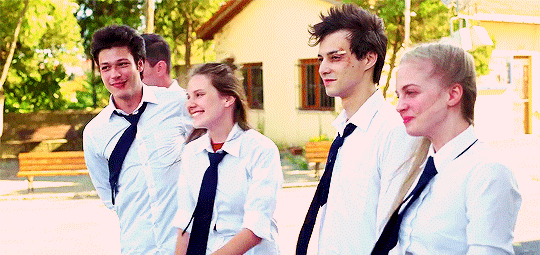
(gif credit : @brumarchesine)
So apparently I am a total ho for Turkish tv shows!
This show is so freaking cute I cannot! Its a netflix show and its so endearing and I love it!
It’s a Turkish Teen Drama set in the 90′s about a group of teenages rebels (?) who would be expelled from their school if not for their teacher who vouches for them.
When they realise this teacher is about to move to a different town, they know their chances of staying in school and not being expelled are non-existent. So device a plan to have he fall in love so she'll have a reason to stay in town with them.
And let me tell you! The ships in this show are so pure it literally makes me want to scream! I love Sinan and Isik + Burcu and Kemal
Those are really my only tv show/movie suggestions that have similar premises or dynamics as Our Times... However, we will do some honorary shout out, shall we? (Which is to say, I’m going to spazz about random shows/ships)
Dark (2017 - 2020)

Dark is literally like none of the concepts I described above? Purely because it's a mystery/thriller about the disappearance of two children in a small German town. It’s a very explicit and dark (pun intended) and grim show... and has some serious eerie feels!
HOWEVER!
I would actually die for Aleksander and Regina Tiedemann so jot that down!

(LOOK AT THEM!) If anyone looked at me the way Aleksander looks at Regina, I would probably die!
#asks#sky high#our times#movie/show recs#also you could try to watch Erkenci Kus#its my current guilty pleasure!#@personinthepalace
13 notes
·
View notes
Text
Building A Better Protagonist

Yes, predictable I know. But it’s me after all. You should have expected no less. Jokes to the side, though, this fella is in the upper crust of main characters. Certainly of the main characters named ‘Jack.’
A good protagonist is the fuel of any narrative. A bit obvious when broken down like that but many do forget. The audience is more or less stuck with this character for the duration of the story - in some cases for years - so it’s important to give them a good reason to follow along.
There are several ways to do this. The most practiced and effective method is with a dynamic character arc that moves the protagonist both physically and tonally. The wider the arc, the more interesting the story (with other variables added of course).
I almost wrote a similar piece about Kylo Ren, but I don’t feel like tempting Stan Twitter today, so I’ll stick to more familiar waters.
Even in a fictional world, the first impression has to count. It’s different in this context because in real life, someone’s initial opinion of a person is often enough to shape their view of them going forward. When crafting a narrative, one has the advantage of steering that opinion, even changing it from scene to scene.
When we first see Jack, our impression of him is that of every Devil May Care action hero of the era. He’s a mile in the air, about to cross into hostile airspace, and is openly smoking a cigar with minutes left until his base jump. Further on, we get a close up of his shit-eating grin as he spots beehive hanging above an enemy soldier. Functionally, this is just the game directing you toward the easiest way to clear a path without engaging in combat. On top of that we get to see how different this Snake is from the established series protagonist, Solid Snake.

Naked Snake: Slapstick Comedy Enthusiast
Fast forward a bit (past the superhero landing and intro card) and we see something different entirely. Jack is speaking with his mentor for the first time in five years and his demeanor changes. No longer confident and aloof, he is pensive and anxious. Annoyed at the woman known as The Boss for leaving without a proper goodbye. We don’t know who this person is but we know what affect she has on our protagonist. Put a pin by this point.
Jack’s mission is to retrieve a Russian scientist who defected to the States but was transferred back GBA style after the Bay of Pigs. You see, because Jack is a CIA agent during the Cold War. He is devoted completely to the cause of the US Government - observing his directive without protest. This is where his thematic journey starts, so to speak.
The Boss warns him that the Mission is all that matters in war. Your comrades today could be your enemies tomorrow [foreshadowing!!] so it really isn’t worth it getting attached to anyone in the field of battle. This is Jack’s first lesson and the first obstacle he must overcome as his teacher defects to Russia and throws him into a ravine.
(Quick aside here as this piece is about Big Boss and not The Joy and while I think her character is fascinating and complex in equal measure, it would also require another essay entirely. So, quick notes here. She didn’t actually defect. She was a double agent deep undercover trying to intercept a nuclear weapon. The mission went sideways so she had to defect for real to save her cover.)

This is a clear turning point, both in the story and in the character. The warning of The Boss has come true. Your beloved mentor is now the antagonist. Literally the Final Boss: the last person you fight on your journey. Jack spends much of the runtime processing this. He is also told by multiple people on his path (including Ocelot, a triple agent working for your CO) in basic layman’s terms that he has to kill The Boss. She’s an enemy of the State and directly opposes his objective. The bulk of the game is Jack building up the nerve to do this.
We’re a long way removed from the guy smiling and cracking one-liners. Over the course of the story we see him traverse the aforementioned arc. It’s more than just the superficial journey of Point A to Point B. We see Jack move emotionally, becoming more cynical and unsure of his mission. He physically changes, too. Losing an eye halfway through, he spends the rest of the game in the eyepatch he would later become famous for.

Movement of any sort is inherently dynamic. It’s well enough to simply have a character move from one end to another. To add texture to the narrative, though, there should be questions. How long will this journey take your protagonist? Where will it take them? Is the end of their arc the end of the story? Will the journey change them? If it doesn’t, why not? How will the other characters react to them? These are all minor things that add up over time as the audience keeps track of the different moving parts. In this example, it’s important to remember that Snake Eater was the third numbered installment in the Metal Gear franchise. Essentially, a look back in time to see the first steps of Big Boss and his descent from war hero to series villain. To do that, we have to ask questions.

Why did The Boss betray Jack and why does he care? As mentioned before, she had a mission that was compromised. As a double agent in enemy territory, there was no backup to speak of for her. In order to protect the US Government from being implicated in this very covert, very illegal operation she was forced to take the fall as an international terrorist and this is not even the saddest part of this story.
Jack is understandably distraught by this because in addition to being his mentor, it is heavily implied the two lived together for some time. His feelings for her are complicated, but they are obviously quite strong. Once it becomes clear what he has to do, his psyche begins to falter.
How does this change him? To answer that, we get to the real saddest part of this story. The Boss is true to her word from the beginning of the story. Devoted to the mission until the end. She tells the story of her child being born on the battlefield in WWII. She is still a US soldier, but in spirit only. In the interest of avoiding an international catastrophe, The Boss becomes a Russian asset and to make the Heel Turn more convincing, her best student is the one sent to stop her.
In killing her, Naked Snake becomes Big Boss and is so traumatized by the experience, he leaves the Green Berets, goes AWOL in South America and attempts to found a nation-state composed solely of mercenaries. But that’s another game entirely. I don’t need to say this, but Snake is fucked up for life by this. The naïve, bright-eyed soldier we start the game with is crushed by the system he swore to protect and it turns him against it full stop. Big Boss spends the rest of his life warring against it.
Recall if you will what I said about “steering” opinion. We are sympathetic to Snake because we identify the shock and hurt of the betrayal; we want to follow him to victory because of his personal charisma. Then we discover the truth. Worse still, we see the truth through his eyes. That is, the eyes of someone who remembers the exact day they lost contact with their loved one. Five years separated from your favorite person, and you’re reunited in order to end their life. The Boss is no longer the mean woman that tried to kill you in the Act One finale. She’s a tragic figure, specifically because of how we view her through the lens of our main character.

It’s such a powerful weapon in prose. And so, it never fails to astound me to see paid professionals – people in charge of multi-million-dollar franchises – do little or even nothing to exploit this totally free, always effective method of storytelling.
“This is the main character! Clap for them!”
“They’re not doing anything.”
“Clap pls!”
“They haven’t even said anything interesting.”
“They’re tall and have a chiseled jawline! That is worth one clap!”
As the kids would say, make it make sense.
#metal gear solid#mgs3#snake eater#big boss#the boss#character study#should be working on the batman#but this wouldn't leave me alone
9 notes
·
View notes
Text
Van Zieks - the Examination, Part 1
Warnings: SPOILERS for The Great Ace Attorney: Chronicles. Additional warning for racist sentiments uttered by fictional characters (and screencaps to show these sentiments).
Disclaimer: These posts are not meant to be taken as fact. Everything I'm outlining stems from my own views and experiences. I am a 30-something European woman, and therefore may not view the matter from certain angles. That said, I'm always open to more input from others. If you believe that I've missed or misinterpreted something, please let me know so I can edit the post accordingly. If we can make this a team effort, I would love that.
The purpose of these posts is an analysis, nothing more. Please do not come into these posts expecting me to either defend Barok van Zieks from haters, nor expecting me to encourage the hatred. I am of the firm belief that characters are no more than a tool created to serve a narrative purpose, therefore the question I'm posing is whether or not Barok van Zieks serves this purpose. That's all I'm doing here.
I'm using the Western release of The Great Ace Attorney Chronicles for these posts, but may refer to the original Japanese dialogue of Dai Gyakuten Saiban if needed to compare what's said. This also means I’m using the localized names and localized romanization of the names to stay consistent.
It doesn't matter one bit to me whether you like Barok van Zieks or dislike him. He's not real anyway, so he can't suffer from it. However, I will ask that everyone who comments refrains from attacking real, actual people. If you know you're morally in the right, there should be no need for insults to begin with. Let's keep this conversation civil and constructive!
As the first post in a series, let’s first start by examining the expectations we would have for a character like this. The purpose he was meant to serve.
1: Expectations
As I said in a different Barok-related essay, the main prosecutor of any Ace Attorney game has been, and always will be, an antagonistic force. Not a villain, not even necessarily someone who exhibits immoral traits. (Hi Klavier!) Just someone who impedes the protag’s goal of getting a not-guilty verdict. In order to have an effective antagonist, they need to mirror the protag's weaknesses back at them. Ace Attorney does this quite well, as the prosecutors represent the obstacle/turmoil that the defense needs to overcome. Often times, the prosecutor is also tied to a pivotal moment in the attorney's past, making sure the strife is quite personal.
Considering the game's plot and settings, it would've been difficult for Barok to be tied to Ryunosuke's past. (He is tied to Asogi's past, funnily enough, but that's a matter I also addressed in that other Barok essay.) So instead, Barok represents Ryunosuke's struggle in more of a figurehead capacity. I've seen people dub him the 'CEO of Racism', and I'm not gonna lie, in a way that's correct. Barok was designed to be the mouthpiece of the harmful sentiments Japanese exchange students would have encountered in the 1900s. By extension, since Ryunosuke is an exchange student unfamiliar with the British courts (or even courts in general), the prosecutor would target the fact that Ryunosuke 'does not understand how things are done here'. Which he does- a lot. This makes it all the more satisfying when Ryunosuke proves him wrong by outsmarting him and using Britain's own laws (such as the closing argument) against him. So yes, you may hate Barok for uttering racist sentiments and dismissing Ryunosuke's abilities, but the ultimate goal here is that Barok's defeat is made sweeter as a result. The narrative end-game is Ryunosuke's triumph and validation in the courtroom.
Was there a different personal struggle Barok could have represented? Yes, but also no. Sure, his vendetta could have been strictly with the Asogi family and Ryunosuke could have admitted to carrying Asogi's resolve, not knowing what it meant. Though that would’ve implied very early that Asogi had a history of sorts in Britain and would’ve destroyed some of the surprise we experience in game 2. Alternatively, there was also the 'parallel' antagonist angle. The sort of villain who says the line “we're not so different, you and I.” The antagonist who shows what happens when someone with the same skills or motivations follows the wrong path, which emphasizes the right path for the protagonist. However, I can't see that working in the plot of this game.
A purposeful decision was made by the writers to have prejudice be a central theme of the plot. This is the matter that hits the hardest in an emotional sense. Therefore, having Barok be the centerpiece of this prejudice ensures he leaves the biggest narrative impact.
---
However, another long-running aspect of the AA prosecutor is the redemption arc, so let's turn our attention to that!
I'm not going to put too much effort into explaining this, I just want to talk about the requirements of a redemption arc. We all know these types of arcs, a lot of Ace Attorney prosecutors have them. We see them in fiction all over. Noteworthy examples of redemption arcs done well include Zuko from The Last Airbender, Michael from The Good Place... For argument's sake, let's toss Edgeworth in there too. I'm not saying Edgeworth's arc is done well, but at the very least it is accepted by most as something that served its intended purpose. I've never seen anyone question Edgeworth's transformation.
See, what we have here is a bit of a misnomer when it comes to what people expect to get out of these types of arcs. Redemption in itself is only 'deliverance from sin' or 'being saved from evil'. It's the thought that a horrible person can still see the error of their ways before it's 'too late'. However, when it comes to absorbing media, often a character gaining knowledge that they were in the wrong isn't enough to satisfy the audience. Would Edgeworth have had a satisfying redemption arc if he'd acknowledged his arrogance and dirty tactics, only to retire as a prosecutor? No way. We needed him to return in the following games to give us an update on his status. Standing in court as a defense attorney, at the risk of damaging his reputation, was the moment we knew he'd grown for the better.
What we require for the arc to come to a good conclusion is atonement. The character in question must not only apologize for their actions, but repent in a more active manner to show that they've changed their ways. Following that, the atonement must be acknowledged by others. So for example, Zuko joins the ATLA gang to help them in any way that he can until even the most skeptical of the group, Katara, acknowledges his transformation into a better person. Now add to this the notion that the character's atonement must be virtuous and sincere. The Good Place is a fascinating look into the debate of 'is it ever too late for a person to change?' and the moral complications of changing in the first place. If you're only doing good things because you want to be saved from damnation, are you being a good person or are you being selfish? There's such a thing as corrupt motivation; only doing good because it is expected. For example, does sponsoring a library make Magnus McGilded a good person? It does not, since he's only doing it to boost his own reputation and have people believe he's selfless.
As a final note, I want to ask: Does a redemption arc require a backstory to justify the character's immoral ways? Personally, I don't think that it does. It's good to have, since it allows an audience to empathize with the character and give them more of a reason to root for them. It turns the redemption arc into a tale about overcoming past trauma. However, it can backfire when done badly and lead to frustration. (I'm looking at you, live action Disney movies!) Some characters are evil just for the sake of being evil and even then, they can turn over a new leaf because they realize it is just so much more rewarding to be good. Just look at Michael from The Good Place.
What's more effective than a backstory, in my opinion, is smaller details to humanize a character. Humanization can also lead to empathy, perhaps even relatability, and helps us believe that they're capable of change. We need to be told that a character has their own fears, their own flaws, their own odd little habits which deviate from the norm... Again, I'll point to Michael from The Good Place for this. Another humanization tactic, which we see employed often in Ace Attorney, is to display a prosecutor's likes and hobbies outside the courtroom. Edgeworth's fanboying over the Steel Samurai, Blackquill's love for birds, Nahyuta's willingness to stand in line for hours to get his hands on a delicious burger... I've feel ya, Nahyuta. This tactic is more readily employed in Ace Attorney because it's difficult to place a prosecutor in a position of weakness before the final showdown. You can show them tending to hobbies during Investigation segments, but you can't show them waking up from a nightmare or wondering whether their father loves them. Well, not until case 5 of that game, anyway. By then, it's too late to serve as the sole humanization factor.
Did Van Zieks need to be redeemed at all? The way I see it, the only correct answer is yes. What do we want to see in our world? Do we want people who hold racist prejudice to acknowledge their faults and become better, or do we want them to die clinging to their shitty moral compass? Do we want a world where everyone learns to get along, or do we want a world where people continue to be in the wrong and act like assholes until they inevitably get punished by law for something or another? Van Zieks needed to be redeemed in order to teach that valuable lesson that it’s never too late to be a good person and that it pays to be a good person.
So to summarize, what we needed from Barok van Zieks was the following:
1) Present an antagonistic (possibly immoral) force who personifies Ryunosuke's biggest personal obstacle/weakness, in this case racial prejudice.
2) Humanizing traits begin to show.
OPTIONAL: A backstory to justify any immorality he has.
3) Over time, Barok has his realization and sees the error of his ways.
4) Barok atones for his immorality, not simply through apology but by taking decisive steps.
5) The cast around him acknowledges his efforts and forgives him.
This leaves us with the question: Does the game deliver on these points? Well, let's boot it up and find out! Stay tuned for The Adventure of the Runaway Room! (as a warning, it’s gonna be LONG)
#dgs#dgs spoilers#tgaa#tgaa spoilers#barok van zieks#oh god here we go#i actually already finished Runaway Room but I need to let it sink in#it was a doozy
50 notes
·
View notes
Photo
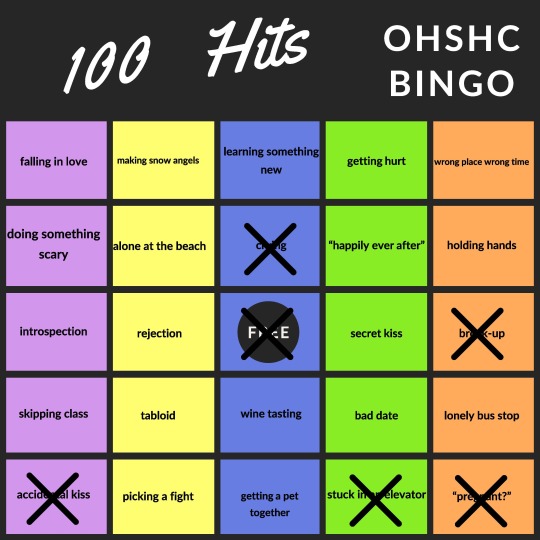
This is my first time ever doing any type of fan prompted writing event for myself and let me tell you I have some thoughts!!
But before thoughts let’s talk numbers.
Start Date: 1/8/2020
End Date: 1/24/2020
Total Fics Created: 9
Total Word Count Posted: 11,935
Prompts Received Anonymously: 5
Prompts Received By Users: 4
Longest Fic: Burning Intentions (2,203)
Shortest Fic: Attorney First, Wife Second (754)
Thoughts:
It was interesting to see which pairs and couples my general audience was requesting. By far the two most popular requests where anything to deal with Kyoya (my OTP) and Mori. You wanted my two favorite boys to get some comfort and happy endings and I was happy to supply them. Now that I step back and look at them, I will give you little fun facts or interesting thoughts I had while writing each one (mostly because I think it is interesting how writers explain their process of writing or their opinions on their own writings). The list starts chronologically from first to last fic posted.
1. Bland Cereal & Pregnancy Brain (Mori x Haruhi)
I imagine that of all the hosts these two will have the closest thing to what Haruhi would deem a normal life. They will make time for each other and always try to check in on each other. If Haruhi wants normal life filled with a steady stream of love then Mori is her guy. I giggled my way through this prompt at Haruhi and her oblivious nature (my favorite quality about her). This prompt took two sittings to complete. The first to write it and second to edit. Overall one of the quicker ones I wrote in this batch.
2. Attorney First, Wife Second (Kyoya x Haruhi)
This fic is one of my favorites that I have written. It is also the first posted fic where stuff gets steamy. I was gasping and eeping the whole time writing their steamy elevator interactions. This story took 1 sitting to write, edit, and post.
3. Solemn Tears (Kyoya x Mori)
As stated in the original post this is the first-ever M/M fic I have written. IT WAS SO HARD. Not because it was M/M but because both characters don’t really ever let their guards down long enough for them to cry. Not only that, I really had to dig and analyze what would really push them to the point that they would cry. Have you ever seen two brick walls cry? Cause I sure haven’t! Their dynamic is interesting and I am glad that I got this prompt to stretch my writing skills. Multiple sittings required because I had no idea how I was going to write it.
4. Shrouded Kiss (Kyoya x Haruhi x Tamaki)
Oh, the angst! Out of all the fics posted this one felt the most OOC. My first thought when I received the prompt was, “Kyoya never does anything by accident.” Haruhi was a little OOC in my opinion but that’s because of how Kyoya proposed the idea of finding love. Do I believe what he says about only knowing once you have tried things with different people? No, but there is merit to say that each relationship and person you are with is going to feel different. Some people are just naturally passionate people while others are more subtle with their love. From what I recall this was a pretty easy write and edit.
5. Obliviously Pregnant (Kyoya x Haruhi)
Haruhi probably couldn’t even surprise Kyoya with a pregnancy even if she tried. She might not have married a doctor but when you marry into a family who is a leader in the medical business nothing will stay a secret for long. On top of that, I am sure that Haruhi is so focused on work that she would actually just convince herself that she is sick rather than being pregnant. Now reader, I know you are curious as to why I decided to bless them with twins. Well, you see…..plot device. That’s really it. Plus, after I asked Google about multiples and pregnancy I was plagued with diaper ads. Note to self, use incognito more often when asking questionable questions.
6. Salmon Side Effects (Tamaki x Haruhi)
This was the first “Free Space” prompt. And I was in the thick of writing and posting. By the time I got to this prompt, I was tired. Not long after I got this prompt I experienced a depressive episode and spent the week slowly crawling out of the pit. I just couldn’t bring myself to work on this fic. I knew I would have to write Tamaki super excited and all I could think about was trying to make it throughout the day without crying. But I got out of the pit and finished it. Multiple sittings needed for completion.
7. Unyielding Devotion (Mori x Haruhi)
I am not sure when it comes to other writers but I cannot read and write fic at the same time. And after binge writing the last few fics I needed a break. I needed to read some fic! One night I was scrolling through FF.Net and decided it was time to start working through my 70+ fics waiting to be read. Picked a fic and I was off to the races (Something Honorable This Way Comes by ilovemori9). It was sweet and wonderful and totally the opposite of a break-up prompt. I think with the break up he was trying to do right by her, wanting her to not be held back by what was required of him. When I first started brainstorming this prompt I was going to have Kyoya lurking in the shadows waiting to take Haruhi as his own but the story wrote itself and it wrote Kyoya out of the story. I think it is better that way.
8. Broken Banner (Mori x Haruhi)
TINY HAMMER! Running joke between @ohshcscenerios and myself. This was such a fun story to write! Once I started I just had to finish. I don’t normally lean towards cute and innocent so it was a nice change of pace. Mori is held in high regard but he is, after all, a high school 3rd year. And he has a soft spot for Haruhi. Also, did you know that Mori is 6’2” while Haruhi is 5’1”? How do you accidentally kiss someone who is a foot taller than you?? So part of the issue in creating this story was how to get their mouths close enough to bump lips. I think the outcome suited the prompt. This was a two sitting story.
9. Burning Intentions (All Characters)
The final prompt….this prompt I tell you what. I will be honest I loathed this prompt in the beginning. I was utterly at a loss as to how I was going to write this. I opened the doc, stared at the prompt and closed the doc multiple times over the span of a week. It was like that episode of Spongebob where he had to write an essay and he felt like he was doing so much work but all he did was the fancy-looking “The”. I almost gave up on it. I almost posted an apology instead of actually trying to write something. In a last-ditch effort, I pulled up Pinterest and searched the word ‘fire’. And then an idea hit me! I wrote part of it one night and finished it up the next day. This story quickly became a favorite because of the witty banter between the hosts. I was laughing at my own writing. I am now very proud of this story!
Final Thoughts & What’s Next?
Throughout the last 16 days, I have accomplished many things when it comes to writing! I went from only having posted 4 fics to now having 13 fics. Today (1/24/2020) on FF.Net Boundless Opportunities (Kyoya x Haruhi) reached 200+ views. On top of the 11,935 words I have posted I have also written an additional 9,124 words for other projects I am currently working on. That is a grand total of 21,059 words written from January 1-24! In my free time, I also finished The Girl on the Train by Paula Hawkins and am 13 chapters deep with The Handmaid’s Tale by Margaret Atwood. On top of everything else, I created a beta profile! I have done so much this month and I want to thank everyone for their support and kind words! They really do me so much to me!
January has been busy! So I am looking forward to celebrating Freedom February!! I am giving myself permission to do whatever I want in February. I still have 11 more paper books to finish as well as 100+ fanfiction stories waiting patiently waiting to be shown attention. Basically what I am saying is I want to spend more time doing other hobbies as well as work on some of my wips that I have been neglecting since I started this project.
Speaking of wips I will be spending February obviously working on my Kasanoda x Haruhi fic but also an idea that sprung up into my head this past week produced a very interesting idea for an AU bad boy fic with Hikaru x Haruhi that has some potential to become another multi-chapter story. Too soon to say if anything will come of it but I want to keep my options open!
TL;DR: January was crazy. Lots of writing. Background information for each fic posted from the bingo prompts. A list of January achievements. Don’t expect me to post anything prolific in February. Using my free time to explore hobbies other than writing. Diving headfirst into digital and paperback stories. Hopefully, make progress on my two main unposted projects. Stay tuned for updates and questions regarding my wips. Thanks!
Special shout out to @ohshcscenerios for helping me out so much! Half of my stories wouldn’t be nearly as good without your help!! Thanks for pushing me to write some fluff instead of just sad angsty fics! Go check out the blog for all your burning host club asks.
If you would like to read any of these fics you can find them on Tumblr, AO3, or FF.Net.
#100 hits bingo#OHSHC#ohshc fanfiction#haruhi fujioka#tamaki suoh#Kyoya Ootori#takashi morinozuka#mitskuni haninozuka#hikaru hitachiin#kaoru hitachiin
12 notes
·
View notes
Text
Where do we go from here? A look back and a speculative look ahead in the wake of The Last Jedi
Now that The Last Jedi has finally arrived, I wanted to take a look back at some of the analysis and speculative essays I wrote over the past two years to see how those ideas fit (or don’t fit) into the story Rian Johnson has given us, and what surprised me most about the character revelations in TLJ. I’ll use these ideas as a springboard to look ahead to where the saga might lead in its third act, and since I love speculation as much as the next fan, I’ll wrap this essay up with a crack theory.
All this is spoiler-intensive, of course, and this got long-ass, so...
Looking back
In what remains my primary analysis of the new saga, I argued that we can safely assume the new saga is telling a redemption story for its main character, Ben Solo; not only because redemption is a primary theme in Star Wars, but also because that’s the kind of story Adam Driver would be interested in telling, based upon his own personal story and the work he and Joann Tucker are doing through their non-profit, Arts In the Armed Forces.
I delved into what appeared to be conflicting canon accounts of Snoke’s influence on young Ben, how much this interference might have affected Ben’s agency in his fall to the dark side, and the degree to which the storytellers were willing to embrace a storyline in which the main character has been subjected to abuse at the hands of a villain able to intrusively enter and influence his thoughts.
I asked questions about what might really have happened to destroy Luke Skywalkers’ Jedi training program, and presented the argument that things did not go in the way we were invited to believe in The Force Awakens.
Finally, I examined Leia’s role in the fall of her son, how politics in the galaxy far far away may have influenced his fall, and how the broken saga can reach a meaningful conclusion after Carrie Fisher’s death.
Where do we stand now?
Clearly, Ben Solo will be redeemed.
The clues were there in The Force Awakens, and Rian Johnson’s Last Jedi went further than my wildest dreams in the presentation of Ben Solo as a sympathetic character. Those of us who came out of The Force Awakens two years ago saying, “Save Ben Solo” were…in the minority. This is no longer the case.
I’m taking some pleasure in having been half-right in my guess about the truth of what happened when Ben fell to the dark. I’d hoped (perhaps ironically, given how I feel about the Prequels) that Ben’s turn would have been rooted in political and ideological beliefs, and may not have included any deaths at Luke’s training site, but The Last Jedi makes clear that there were fatalities there.
What surprised me the most about TLJ was the fall of Luke Skywalker. Based on the vicious condemnation of Last Jedi from certain segments of the fanbase, I was not alone in this. Knowing now that Ben Solo didn’t so much fall to the dark as he was pulled by Snoke, and pushed by Luke, the circumstances of his departure from Luke’s tutelage have to be seen in a different, morally ambiguous light, and Adam Driver’s repeated statements that he has been playing Kylo/Ben as a character who believes he is right make perfect sense now.
Looking ahead
Much like The Force Awakens, The Last Jedi left us with mysteries and unanswered questions. Plenty of disgruntled Star Wars fans with a bloated sense of entitlement have taken this as evidence that the storytellers have no plan, that Rian Johnson ignored JJ Abrams’ work in TFA, or that the saga as presented in The Last Jedi is somehow, absurdly, “not Star Wars.”
I have no patience for people who present themselves as fans and then proceed to sh*t on the work of the thousands of people involved in bringing Star Wars to life. I’m making a conscious effort in this essay not to write in rebuttal to people lobbing hate at the Last Jedi, but let me just say this: The Last Jedi is part two of three. Important parts of the story are yet to be told.
Aside: I really miss Carrie Fisher, whose acid wit would have helped cut Star Wars trolls down to size, but if nothing else, The Last Jedi tells us that we have to stand up for ourselves, even if we’re ‘nobody.’ We all have a role to play, and we can be the hero we need. I loved The Last Jedi, and I think it may be the best Star Wars movie to date. With that, let’s look ahead:
No one’s ever really gone
I’m an old, old fan of the OT, but I was never a Luke Skywalker partisan. Maybe I was distracted by Han and Leia’s relationship, but somehow Luke’s transformation from this

to this
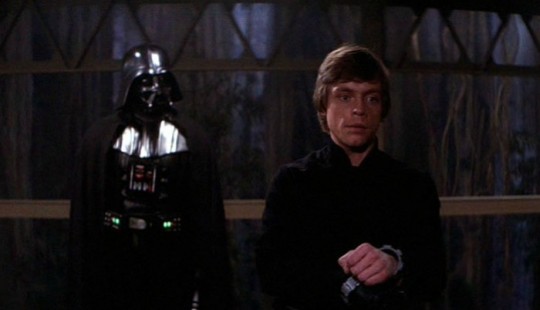
Never quite worked for me. How did his change of heart happen so quickly and so completely? The Luke Skywalker of Return of the Jedi always struck me as, frankly, a bit of a sanctimonious prick.
The bitter, disillusioned Luke who has isolated himself on Ahch-To is the most human and relatable version of this character I have encountered, and I love him.
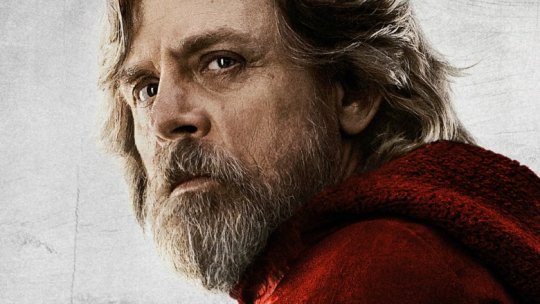
I was surprised that Rian Johnson made Luke’s fall the central sin of The Last Jedi, but in no way does this make me think less of Luke as a character, nor does it seem that Luke acted out of character in either the backstory to Ben’s fall, or in his confrontation with Ben at the end of TLJ. Grief and guilt motivated his self-imposed exile. Was there anger there, too? At himself? At the Force? In any event, his parting line to Leia, “No one’s ever really gone,” is true at many levels. Luke is speaking about Ben. Mark is talking about Carrie. Luke is talking about himself.
Fans who just think that Luke Skywalker died in TLJ have missed the point. Luke was so broken by his role in Ben’s fall that he cut himself off from the force. He found this connection again, used it to save the spark of the rebellion, made the first connection back to Ben since their falling out (and incidentally, held his nephew back from acts which would have sent him further into the dark), and finally became one with the force and ascended as a true Jedi master; filled with peace and purpose. It’s beautiful!
And it’s not the end. Luke Skywalker will still have an important role to play in episode IX. I’m sure of it.
Claudia Gray’s Bloodline and The last Jedi
The Last Jedi did not directly address what we learned about galactic politics and Leia’s relationship with Ben during the timeframe of Claudia Gray’s Bloodline. I was surprised by this in my first viewing of TLJ, but from a storytelling standpoint, I understand how including these details would have required additional exposition in a way that didn’t fit within the structure of the film. What is implied in Bloodline about the events leading to Ben’s fall complements the version of the tale we hear in TLJ without adding detail which the audience didn’t need at this time, and which may unfold in episode IX.
Luke senses the darkness rising in Ben and goes to confront him: Based upon what we know from Bloodline, this confrontation probably took place at the end of a long day (or days) following the revelation that Ben is the grandson of Darth Vader (and Master Luke is Vader’s son!). I can imagine the chaos and turmoil this created within the small group of Luke and his students. Luke, in his moment of weakness, mistakes Snoke’s darkness for Ben’s, and contemplates his murder. Ben fights back against the threat to his life, and then battles with those who saw him strike down their master. He escapes in the company of his friends. Luke tells us he had a dozen students, plus Ben. If we want a body count at the end of what people called the “jedi massacre,” I’m going to say it stands at about five, and we have no idea how many of those were killed by the fearsome Kylo Ren.
The Knights of Ren
It’s obvious who they are now, yes? I’d hoped we would meet the Knights in The Last Jedi, but this is a pleasure that will have to wait until Episode IX.
Luke mentions them so briefly, you could almost miss it. Ben “vanished with a handful of my students and slaughtered the rest.”
Adam Driver almost let slip who they are in an old interview from 2015, when he said, “It was a group that existed before him, that he was a part of.”
The Knights are Ben’s fellow students from Luke’s training project. If people are still doubtful about whether the storytellers have an overall plan, let me remind you that this image of the knights, mysteriously titled, “the seven light,” was part of The Force Awakens pre-production artwork as early as November of 2013.
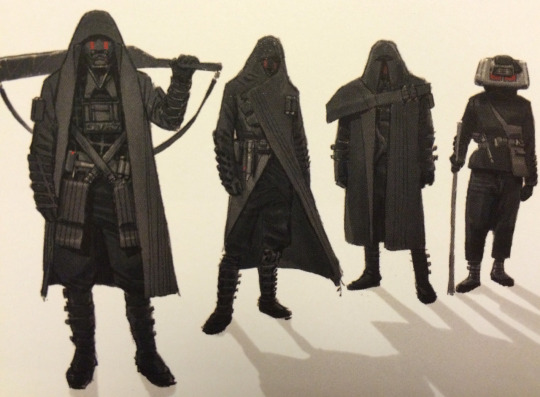
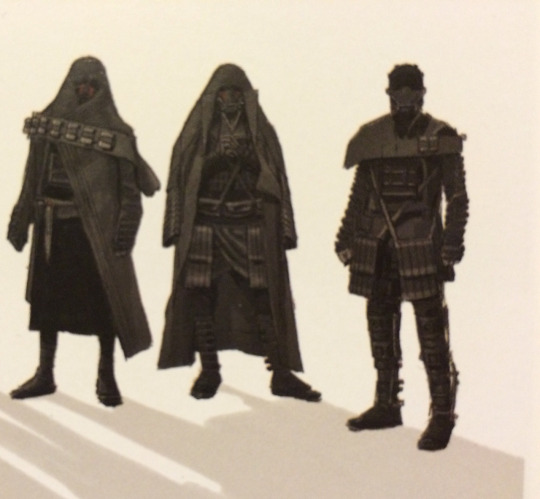
Why didn’t the Knights appear in The Last Jedi? Because the storytellers haven’t had time to get to them, and Ben didn’t need them yet. In universe, little more than a week has elapsed since the opening crawl of The Force Awakens.
Why am I confident we’ll see them in Episode IX? Because Ben, as the newly-minted Supreme Leader of the First Order, is going to need trusted allies to help him hold onto power. The Knights, Ben’s Jedi-trained friends who were willing to follow him into the dark, are easily the most promising set of characters we have yet to meet in the new saga.
This illustration from The Art of The Last Jedi gives me hope that at least one of Ben’s Knights is a girl.
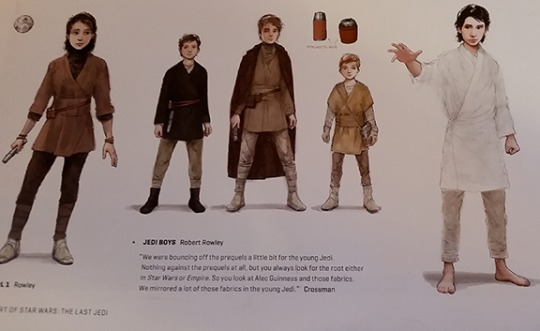
It would make me even happier if not all of them are human. The FO, like the Empire before it, has a bias against non-humans, and seeing the new Supreme Leader surround himself with enforcers and advisors who defy the racist norms of the FO makes me happy just thinking about it.
And Ben’s going to need all the help he can get. He’s surrounded by enemies in the First Order, and it was strangely easy to dispatch Snoke. Almost too easy.
Snoke
How is it that Snoke, a force user powerful enough to shadow Ben Solo’s life from before he was born, and so evil that a glimpse of his darkness in Ben’s mind led Jedi Master Luke Skywalker to nearly murder his sister’s son, was killed so easily in The Last Jedi? And who was Snoke, anyway?
It was too easy to kill Snoke. Ben used Snoke’s power against him to kill him in the throne room, tricking Snoke into seeing one thing while Ben did another; but even in that moment we glimpse the terrible scope of Snoke’s power. He could see everything in Ben’s mind, and it was impossible for Ben to completely hide his thoughts from Snoke. Snoke built the link between Ben and Rey in an attempt to lure Rey into his clutches, but the link survived after Snoke was gone.
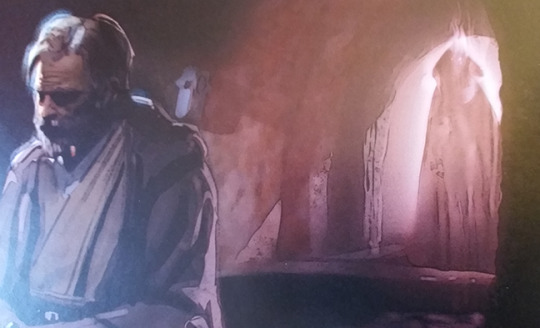
This image is from The Art of The Last Jedi:
“We’ve seen Jedi come back as blue ghosts. Maybe Sith can come back. And maybe there’s some all-powerful mastermind Sith that’s controlling whatever the dark side is. We did talk a lot about how the final frontier for Jedi might be in the spirit realm. So you have to have a bad-guy ghost.”
It’s obvious that Hux will be one of Ben’s enemies in Episode IX, but I suspect that we have not heard the last from Snoke, either. Chuck Wendig’s Aftermath novels teased Snoke’s identity, implying that he might be Gallius Rax, though that character died at the end of the book (murdered at the edge of an erupting dark force borehole on Jakku, so ‘dead’ may be from a certain point of view). Aftermath also suggests that a dark source of the force was calling to the emperor from the unknown regions, into which the Imperial remnant fled. These could just be red herrings, or they may point towards a more enduring source of darkness that is not easily defeated.
The storytellers have told us repeatedly that Snoke is a new character, but I think it’s possible he was inspired by an Old Republic Sith Emperor Vitiate, who transferred his essence from one body to another. Snoke the entity was caught by surprise by Ben’s trick (Snoke was monologuing!), and Ben got the drop on him, destroying his physical body (which frankly, already looked like a reanimated corpse). Snoke’s essence, obviously able to project itself in powerful ways, was probably not destroyed. I think there’s a high probability Snoke, or the dark force entity that was Snoke, will be back in IX.
Ready for that crack theory? Here you go:
Snoke will be back, possibly wearing a new body.
When I tossed this idea out to my daughter, her first thought was that Hux might be a receptacle for Snoke’s consciousness, but I think Hux is already well positioned to be a foil to Ben Solo’s attempt to rule the galaxy, and doesn’t need any encouragement to work against his new Supreme Leader. There is one First Order character we saw fall just moments after Snoke, though.
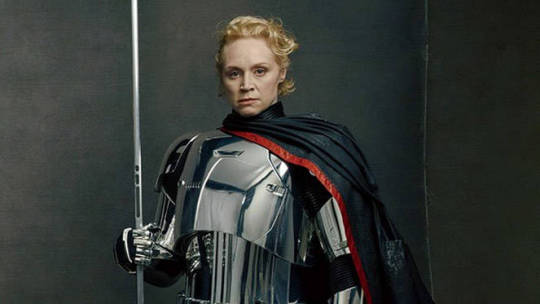
Like I said, Crrrrraaccckk!!!!
In any event, I think I’m safe in predicting that Ben will struggle to hold the throne he’s won, and bring old allies to his side to help him. I think we’ll see Snoke back in some form, and there will come a point in the story when those who are presently enemies may find themselves joining forces to fight a final battle that takes place at least in part, in the spirit realm of the Force. Ben and Rey will have to work together, along with the Resistance, and force ghosts, to defeat the ultimate darkness. Luke will be back. If the storytellers love us, he won’t come alone.

Seriously. Bring all the force ghosts in IX. I want Luke. And Anakin Skywalker. And Obi-Wan Kenobi. And Yoda. And force ghost Leia. Hell, bring me all the Jedi lost in Order 66.
Shout out and thanks to @theboywhocan11 who knows more about Star Wars lore than I ever shall, for reminding me who Vitiate was.
And yeah, I’m tagging this Reylo, because that’s how I’ve tagged all my meta, regardless of subject matter, for the past two years. I don’t care what the rest of this stupid fandom thinks. <3
#tlj meta#the last jedi meta#reylo#episode ix speculation#snoke#force ghost#knights of ren#ben solo#rian johsnon#bloodline#aftermath#look back and look ahead#final battle of the jedi
321 notes
·
View notes
Text
Week 5
Benjamin Percy’s “Making the Extraordinary Ordinary”:
“Burton was enamored with the gritty nightmare of Gotham, the whiz-bang awesomeness of the Batmobile, and was carelss with characterization. So I didn’t believe... I was only a child, but after dreaming my way darkly through Gotham, the movie felt comparitively silly. Because it had no heart” (66).
“I remember my mother crying and running upstairs when I was suspended. I remember my father ripping up my report card and hurling the pieces across the room like the saddest sort of confetti, not saying a word, just staring at me with hooded eyes” (66).
“Silence, I came to understand, was knowing when to shut up” (67).
“Saunders reinvents grief by giving it a beating heart. And he normalizes the weirdness by giving her a pitiable desire we can all relate to. Would the story be just as effective if it were told as realism? Some might say so. But fantasy allows us truths that might otherwise be unavailable. Normally a reflection means little except as a way to check our teeth, to smear on makeup, but before a warped mirror we pause, studying ourselves with awe and care, struck by a new way of seeing” (71).
“We expect winged men to be angelic, muscled and white-robed and blonde-haired and backlit by radiant light, but Garcia Marquez plays against our expectations: this figure is far from heavenly. They call him an “angel”, yes, but they also wonder if he is Norwegian or a sailor, a “castaway from some foreign ship wrecked by the storm.” And he is not exalted, as we would expect, but persecuted. He performs no miracles. He cowers pitifully. They cage him, prod him, pick his feathers, throw stones at him, burn his side with a branding iron. And in this way Garcia Marquez not only makes the fantastic accessible but captures the human tendency to fear whatever is different and the desire to label, define, control” (73).
Benjamin Percy’s “Get a Job”:
“Whether we like it or not, work defines us. Work dominates our lives. And we have an obligation, in our prose and poetry, in the interest of realism, and in the service of point of view, voice, setting, metaphor, and story, to try to incorporate credibly and richly the working lives of our characters” (140).
“Nor, tonally, should you build baroque sentences when the mind of your character is empy, his life unadorned. Her voice shouldn’t sound like white lace and gold trim when her home reeks of cheap whiskey and wood smoke” (144).
“It is a job that frames and sets into motion every element of your story or essay or poem- and it is your job to do the required research that will bring the language and tasks and schedule and perspective of your characters’ work to life. Google can do only so much for you. The library can only do so much for you. You need to write from the trenches” (145).
“Writing is an act of empathy. You are occupying and understanding a point of view that might be alien to your own- and work is often the keyhole through which you peer” (149).
Tom Perotta's "Ordinary People"
““I can’t look at everything hard enough”: The tragedy is that, while we’re alive, we don’t view our days in the knowledge that all things must pass. We don’t- we can’t- value our lives, our loved ones, with the urgent knowledge that they’ll one day be gone forever. Emily notices with despair that she and her mother barely look at one another, and she laments our self-possession, our distractedness, the million things that keep us from each other. “Oh, Mama,” she cries, “just look at me one minute as though you really saw me.... Let’s look at one another.” But mother and daughter remain self-absorbed, each in a private sea of her own thoughts, and that moment of recognition, or connection, never comes. Eventually, Emily has to return away” (130).
“Some people think of Our Town as being sentimental. Obviously, there’s a wish-fulfillment aspect here: the character who returns to the past, in a sense conquering death for a moment. But what’s unsentimental is that it’s too much, the way the experience is heartbreaking for the character. There’s a real emotional courage in the fact that there’s not a catharsis: only an unflinching acknowledgement of the gulf between the town and the cemetery. The living don’t appreciate the dead; the living don’t even appreciate the living. For me, that’s not sentimental- it’s unbelievably tough. The play presents us with a difficult truth, and forces us to take a long, hard look at it” (130-131).
Leslie Jamison's "On Commonness"
“You remember too much, my mother said to me recently. Why hold onto all that? And I said, where can I put it down?” (158).
“I want to tell you how much it hurts, but I’m also going to tell you that there is a vioce inside of me, dogging me at every moment about tryingtoo hard to tell you how much it hurts... Carson’s mode of self-awareness doesn’t apologize for its emotion...” (158).
““I thought I would die” It’s so willfully plain. There’s something moving to me about saying it so embarrassingly straight. The following line, “This is not uncommon,” can be read so many different ways. The tone might be clinical or dismissive, as in, this is not an uncommon symptom of the disease of heartbreak. But it’s also an acknowledgement that what she’s going through is in no way extraordinary. It’s something that’s been felt before, and it’ll be felt again. Yet she owns this commonness, without apologizing for it, relinquishing it, or dismissing it” (159).
“I think there’s an additional layer of use when it comes to personal experience: You just see the events of your own life so differently after more years have passed. That doesn’t mean that the truest version of an event is going to be the version you write when you’re eighty. But your perspective keeps changing” (162).
MAKING THE EXTRAORDINARY ORDINARY—TRUTH:
The truth that exposes itself in “The Miniature Wife” and “The Infamous Bengal Ming” is the failures in the narrator and his wife’s ability to communicate with one another and that wild animals cannot mingle with humankind. The narrator’s wife being shrunken down and the negligence of the narrator portrays how she herself has literally been minimized through the course of their relationship. The marital problems between the narrator and his wife have existed even prior to the events of the story, and now it’s presented as the main conflict of the story. Gonzales reveals that it’s not really the incident that was the problem between them, but rather the catalyst.
In “The Infamous Bengal Ming”, the truth that becomes available in this story is that humans and animals cannot cross the bridge between their nature. Whether or not this is due to a communication problem is up to our interpretation, but everything the tiger does that he thinks will aid humans is villainized and he suffers the consequences of it. In the end, it doesn’t even matter because the tiger’s idea of love becomes distorted due to his senses. He finds some type of twisted euphoria in killing a woman he despises, and because of his hunger he eats her. The tiger still calls it love even though it’s clearly not, and I think Parameswaran is trying to make apparent the futility of trying to bridge that gap between species.
FEAR:
This observation applies to “The Miniature Wife” through the narrator’s fascination with his wife. Rather than try to find a solution to her problem, he observes her as if she is a wild animal as well as gives her a habitat for his own self-gratuitous reasons. We see that views her more as a test subject than as a person through ways such as peering at her through a microscope, prioritizing crafting a dollhouse for her to live with and not making any pursuits to undo the shrinking ray effects. Instead of handling her infidelity with communication, he fears the ramifications of anyone finding out he has two shrunken people in his house and kills his co-worker.
In “The Infamous Bengal Ming”, this theme is present all throughout the story. The tiger approaches humans with good will, but almost everyone recoils away in fear and is killed from the tiger’s advances (understandably). The tiger's position as an apex predator puts him at the forefront of their defensiveness and rather than embrace him, they seek to restrain and control him based on their preconceived notion of tigers being a threat. Fear moves along the plot. The tiger runs away in fear of the consequences for killing the zookeeper, leading him to the house where the woman and her child live in, and because the woman is terrified of the tiger's presence in the room she drops the baby, causing the tiger to catch it with his jaw and eventually kill it. It leads the reader to wonder, what would have happened if the people in this story were not as terrified as the tiger as they were? Would that have changed the way the story spiraled out of control, or would the tiger have given into his animalistic instincts earlier?
CONNECT THE DOTS—GET A JOB AND GONZALES:
The narrator’s world revolves around his job. The way he handles the situation, his relationship with his wife prior to shrinking her and how it ends is all because his job is his life. Due to the way he got caught up in his work, he was never a very attentive husband and always left his dishes in the sink and didn’t clean up even after his wife reprimanded him several times. Because of his constant pursuit of knowledge, instead of doing the reasonable thing and trying to grow his wife, he instead observes her as if she was an experiment rather than his partner. Because of the narrator’s occupation, he has been portrayed as a very cold, obsessive, and negligent man, or maybe that was the kind of person he was to be suited to the job to begin with.
ON COMMONNESS:
I think it’s a matter of the ego? The author summarized why the describing the full scope of your genuine feelings can be seen as something to rag on at pretty well. Adding “This is not uncommon” is a self-aware statement that tells you they’re aware it’s not that big of a deal. I really liked the examination of this concept because being sincere is a scary thing to do when you write, or even in your everyday life. Your works are somehow a bit of an extension of yourself, and by shoving that into the forefront of everyone’s judgement you are exposing your expressed thoughts and feelings. You don’t want to be completely genuine because you’re usually not. There’s not much I can add onto that because I think the essay put feelings into words that I wasn’t able to do myself.
ONE THING:
The fake grandmas was something that I felt was done in a way that could really make us suspend our belief. When they mentioned how when visits from kids became more of a chore than something they enjoyed was the correct time to kill the grandparents off, it made so much sense to me. That was such a calculated strategy on their part because most children’s memories change with the passage of time. They won’t remember every feature on their grandparent’s face, so using their naivety to the business’s advantage works perfectly in the context of the story to me.
Also, the way the stand-ins are required to memorize the entire family tree as well as their parent’s vacations, photoshopping photos to put them in it. It all seems like a huge elaborate gaslighting project. The moment the grandparent is killed off is the moment when the person they’re tricking decides it of their own accord without even realizing it. It made me realize the inevitability of family relationships eventually growing apart. A lot of people aren’t close to their grandparents at all so it was pretty easy for me to accept that them eventually being phased out of their grandchildren’s life is pretty believable.
WILSON:
The narrator’s way of seeing the world definitely bends around her work. Her ability to disconnect from relationships at her job translates into her everyday life, where we see that she doesn’t bother with building her own attachments. She isn’t married, doesn’t have any kids and she refuses to enter committed relationships with other men. Whether or not this is due to the nature of her job or because of her past we don’t know, but we can glean that someone who treats familial relationships as a transaction isn’t very authentic or sentimental.
We especially see this when the narrator converses with her co-workers, who all seem to have a bitter, snarky approach to their jobs. They make death into a lighthearted subject manner or something with a double meaning. When Martha says “I was so good, fams were going to keep me until I outlived all of them. They were going to be leaving me money in their wills” (14) and the narrator reminds her that they all have due dates at one point. it’s not really just about the completion of their agreement as a stand-in. It can serve as a foreshadowing to when being a stand-in truly takes a toll and the narrator is no longer competent to their job.
ORDINARY PEOPLE:
Perrotta’s ideas of ordinary details come in the form of people’s mannerisms: The breakfast they eat in the morning, how someone might put up their hair, etc. The “Grand Stand-in” makes all of those ordinary details into it’s own concept. It’s the grandparent’s job to embody those details and form themselves into a believable person. The narrator is transfixed on the lullaby because she feels the need to prove herself as a professional. Every part of their job is calculated, all those little details that make up their identity is the bizarreness of being a stand-in. The ordinary things about these grandparents are what makes them fascinating because it’s not them at all.
CONNECT THE DOTS:
The “Grand Stand-in” follows Boyle’s advice in “How Stories Say Goodbye” and has a closure where we are more or less satisfied with the ending. The narrator goes through an epiphany where she realizes that she doesn’t want to continue with her job due to wanting something real. The loss she experiences by cutting herself off from all the families is a hallmark of these change because although all the families she involved herself in was nothing but a fabricated lie, quitting unexpectedly gave her “deaths” meaning. She states herself that the sadness she feels is more rewarding and genuine.
0 notes